2026 Events
The Department of Biomedical Informatics hosts weekly DBMI Grand Rounds. Most of our events are held in hybrid format, with the exception of noteworthy DBMI Grand Rounds in Light Hall which are in-person only. Contact lina.sulieman@vumc.org and mia.garchitorena@vumc.org if you have questions and/or would like to be added to our Grand Rounds listserv!
NOTE: For technical reasons, this page may not be up-to-date. Please contact lina.sulieman@vumc.org for detailed information about our DBMI Grand Rounds events!
NOTE: Our Research Colloquiums are hosted under VU's ZOOM licenses and can be accessed by attendees.
DBMI also hosts a variety of events sponsored by our Vanderbilt Clinical Informatics Center (VCLIC) and our ADVANCE AI Center. To learn more, contact elise.russo@vumc.org for VCLIC and mia.garchitorena@vumc.org for ADVANCE!
Please see the schedule for Spring 2026
- Wednesday, Jan. 21 — William Stead (Vanderbilt University Medical Center, DBMI)
- Wednesday, Jan. 28 — Rupa Valdez (University of Virginia, Systems and Information Engineering)
- Wednesday, Feb. 4 — Reed Omary (VUMC and The Greenwell Project)
- Wednesday, Feb. 11 – No Grand Rounds
- Wednesday, Feb. 28 — Siru Liu (VUMC, DBMI)
- Wednesday, Feb. 25 — Digna Velez Edwards (VUMC, OBGYN)
- Wednesday, March 4 — Danielle Mowery (UPenn CRIO)
- Wednesday, March 11 — No Grand Rounds (Spring Break)
- Wednesday, March 18 — Jonathan Teich (Intersystems)
- Wednesday, March 25 — Thomas Lasko (VUMC, DBMI)
- Wednesday, April 1 — Sharon Davis (VUMC, DBMI)
- Wednesday, April 8 — Judith Dexheimer (Cincinnati Children’s Hospital, Pediatric)
- Wednesday, April 15 — ADVANCE Center
- Wednesday, April 22 — Thomas Reese (VUMC, DBMI)
- Wednesday, April 29 — Eric Tkaczyk (VUMC, Dermatology and DBMI)
-
DBMI Grand Rounds: Wednesday, March 5, 2025:
Speaker: Amanda Lazar, PhD, Associate Professor at the College of Information at the University of Maryland; Visiting Associate Professor in DBMI at VUMC.
Talk Title: "Considerations for Designing Health Information Technologies for People with Mild Dementia"
RECORDING AVAILABLE HERE SOON.
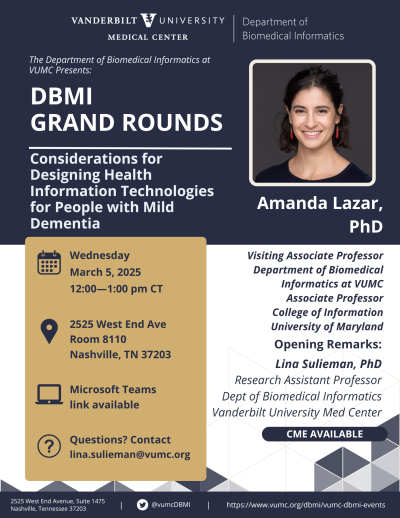
DBMI Grand Rounds: Wednesday, February 26, 2025:
Speaker: Russ Altman, MD, PhD, Kenneth Fong Professor of Bioengineering, Genetics, Medicine, Biomedical Data Science and of Computer Science; Senior Fellow at the Stanford University Human-Centered Artificial Intelligence (HAI)
Talk Title: "Large-Scale Phenotyping in Biobanks"

DBMI Grand Rounds: Wednesday, February 19, 2025:
Speaker: Peter Rebeiro, PhD, Associate Professor (Division of Infectious Diseases) in the Departments of Medicine, Biomedical Informatics, and Biostatistics at Vanderbilt University Medical Center
Talk Title: "Creating a Research Repository: Pathways, Potential & Peril in Using Public Data"
DBMI Grand Rounds: Wednesday, January 15, 2025:
Speaker: Ethan Gershon, MD, Principal of Global Healthcare Informatics
Talk Title: "Two EHR Medication Safety Issues in the Wild: The Vendor Perspective on Antecedents & Responses"
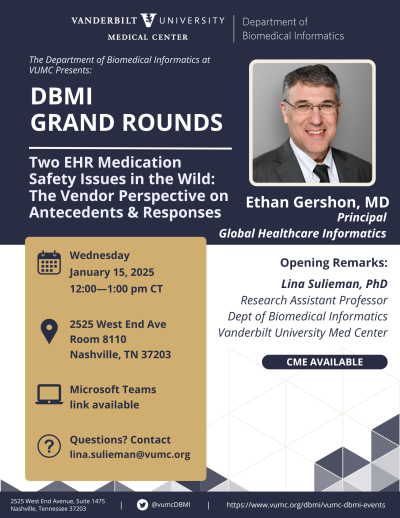
-
DBMI Grand Rounds: Wednesday, November 20, 2024:
Speaker: Lindsey Johnstone, MD, MS, Assistant Professor and Vice Chair of Informatics, Radiology & Radiological Sciences at VUMC
Talk Title: "Dumpster Phoenix: Tale of Rejection, Redemption, and Resilience"
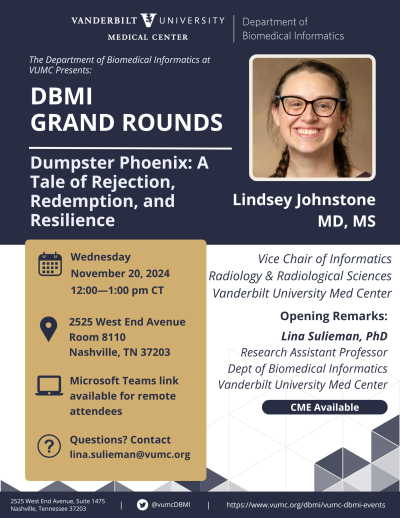
DBMI Grand Rounds: Wednesday, October 30, 2024:
Speaker: Kim Unertl, PhD, ACHIP, FACMI, FAMIA, Associate Professor and Director of Graduate Studies, Department of Biomedical Informatics at VUMC.
Talk Title: "Broadening Pathways into Informatics: Lessons Learned from the Vanderbilt Biomedical Informatics Summer Program"
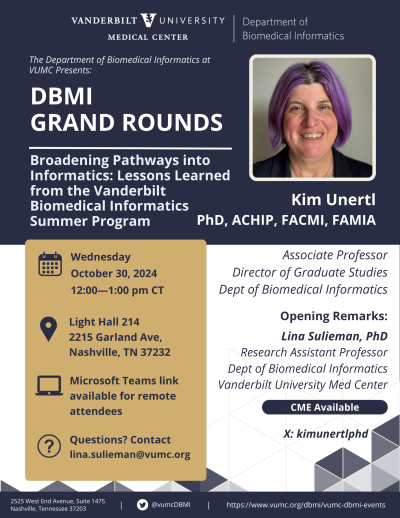
DBMI Grand Rounds: Wednesday, October 23, 2024:
Speaker: Taneya Koonce, MSLS, MPH, Deputy Director at the VUMC Center for Knowledge Management and Mallory Blasingame, MA, MSIS, Information Scientist and Assistant Director for Evidence Provision at the VUMC Center for Knowledge Management
Talk Title: "Evaluating a Large Language Model's Ability to Answer Clinicians' Requests for Evidence Summaries"
Email mia.garchitorena@vumc.org if you'd like access to the recording.
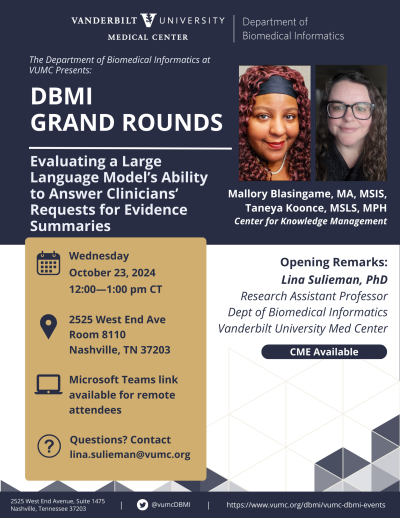
DBMI + Center for Bioethics & Society Grand Rounds: Wednesday, October 16, 2024:
Speaker: Adrienne Boissy, MD, MA, Chief Medical Officer, Qualtrics
Talk Title: "Neuroscience of Trust: Implications for AI and Human(e) Experiences"
Contact denise.lillard@vumc.org if you would like access to the recording!
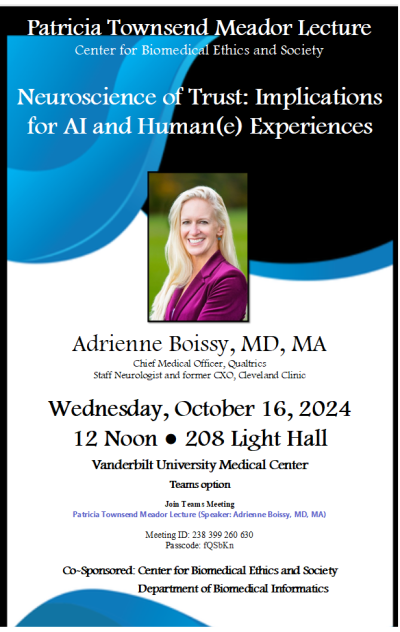
DBMI Grand Rounds: Wednesday, October 2, 2024:
Speaker: Yaa Kumah-Crystal, MD, MPH, MS, Associate Professor of Biomedical Informatics and Pediatric Oncology; Donnie Sengstack, MS, Application Developer in the Vanderbilt Clinical Informatics Center (VCLIC); and Nola O'Sullivan, high school senior at Ravenwood High School in Brentwood, Tennessee.
Talk Title: "Knock Knock! Who's There? ChatGPTickling Your Funny Bone"
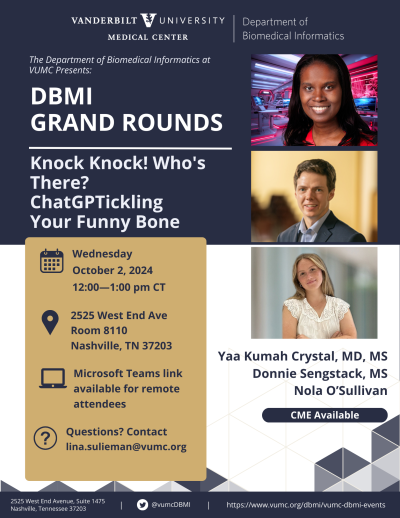
DBMI Grand Rounds: Wednesday, September 25, 2024:
Speaker: Kavishwar Wagholikar, MBBS, PhD, Assistant Professor of Medicine and Computer Science at Harvard/Mass General Hospital
Talk Title: "Dynamic Phenotyping for Enhancing Enrollment for Clinical Trials: Case Studies in Heart Failure"
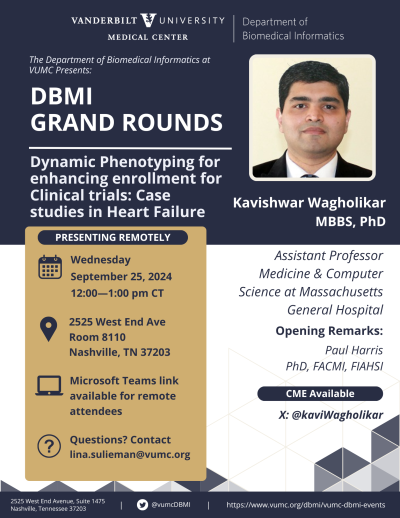
DBMI/CRIH Grand Rounds: Wednesday, September 18, 2024:
Speaker: Natalie Benda PhD, Assistant Professor of Health Informatics at Columbia University School of Nursing
Talk Title: "Re-Centering AI and Clinical Decision Support for Maternal Health Towards Patients"
Questions? Email Mikey Pastrana at michael.j.pastrana.vanderbilt.edu.

DBMI Grand Rounds: Wednesday, September 11, 2024:
Speaker: Thomas Maddox, VP of Digital Products and Innovation at BJC Healthcare, Professor of Medicine (Cardiology) at Washington University School of Medicine
Talk Title: "Innovations in Digital Health to Improve Care Delivery: The BJC/WUSM Healthcare Innovation Lab"
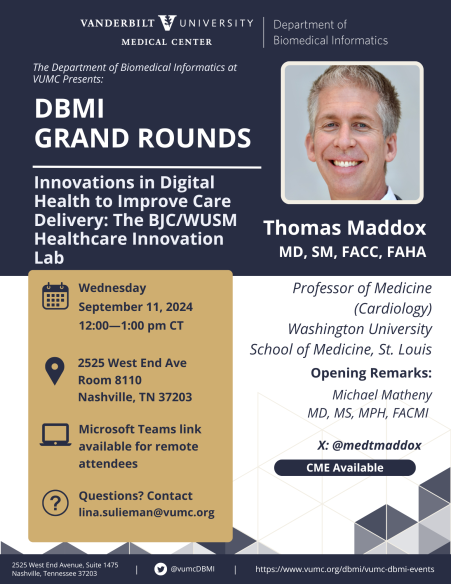
-
DBMI Special Seminar: Friday, April 19, 2024:
Speaker: Philip Payne, PhD, FACMI, FAMIA, FAIMBE, FIAHSI, Director of the Institute for Informatics, Data Science and Biostatistics, Janet and Bernard Becker Professor, Associate Dean for Health Information and Data Science and Chief Data Scientist at Washington University School of Medicine.
Talk Title: "AI & the Learning Health System: Digitally Transforming Healthcare & Decision-Making"
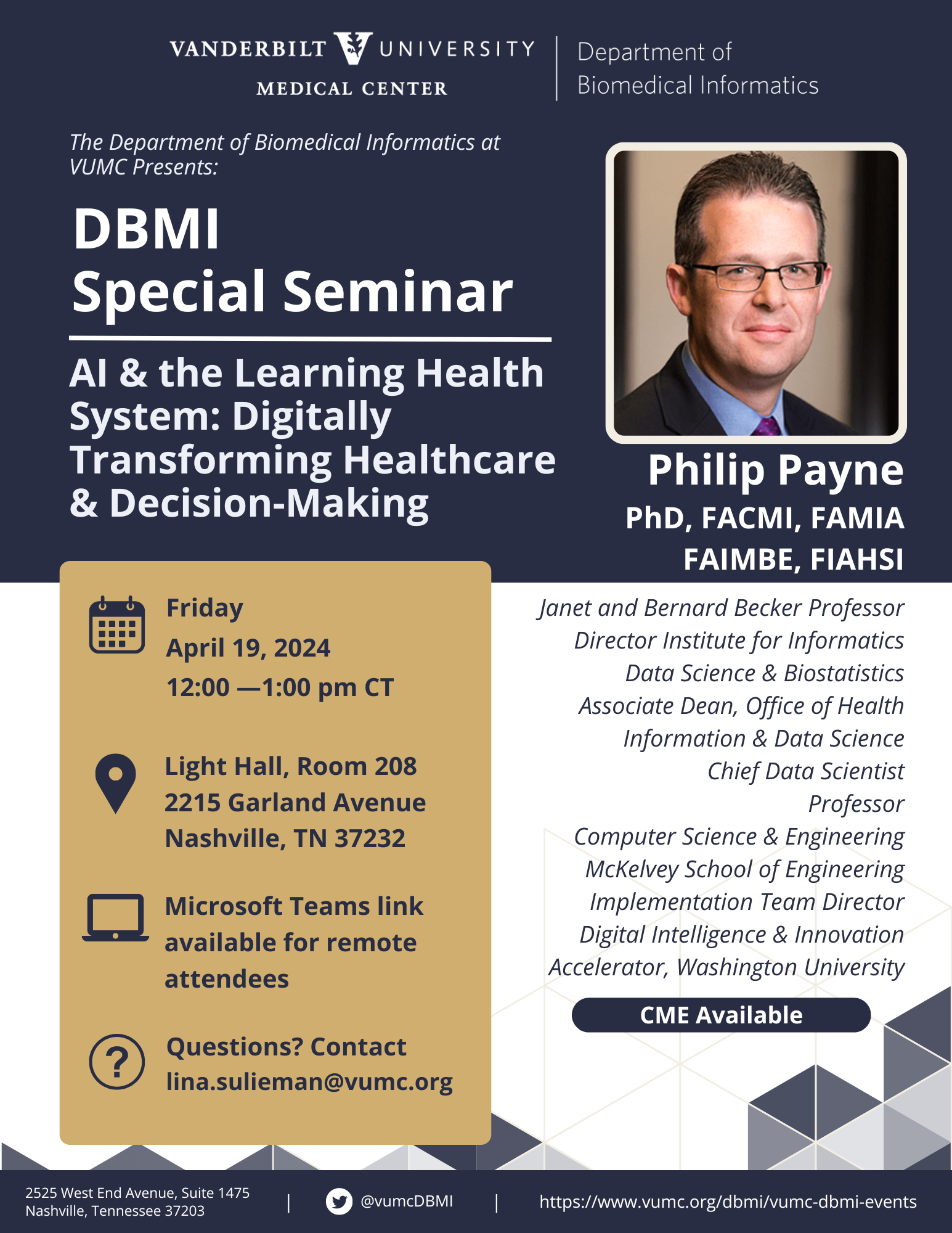
DBMI Grand Rounds: Wednesday, April 17, 2024:
Speaker: Kit Delgado, MD, MS, Associate Professor of Emergency Medicine and Epidemiology with tenure at the University of Pennsylvania and Director of the Penn Medicine Nudge Unit
Talk Title: "Turning Behavioral Insights into Outcomes: Case Studies from the Penn Medicine Nudge Unit"
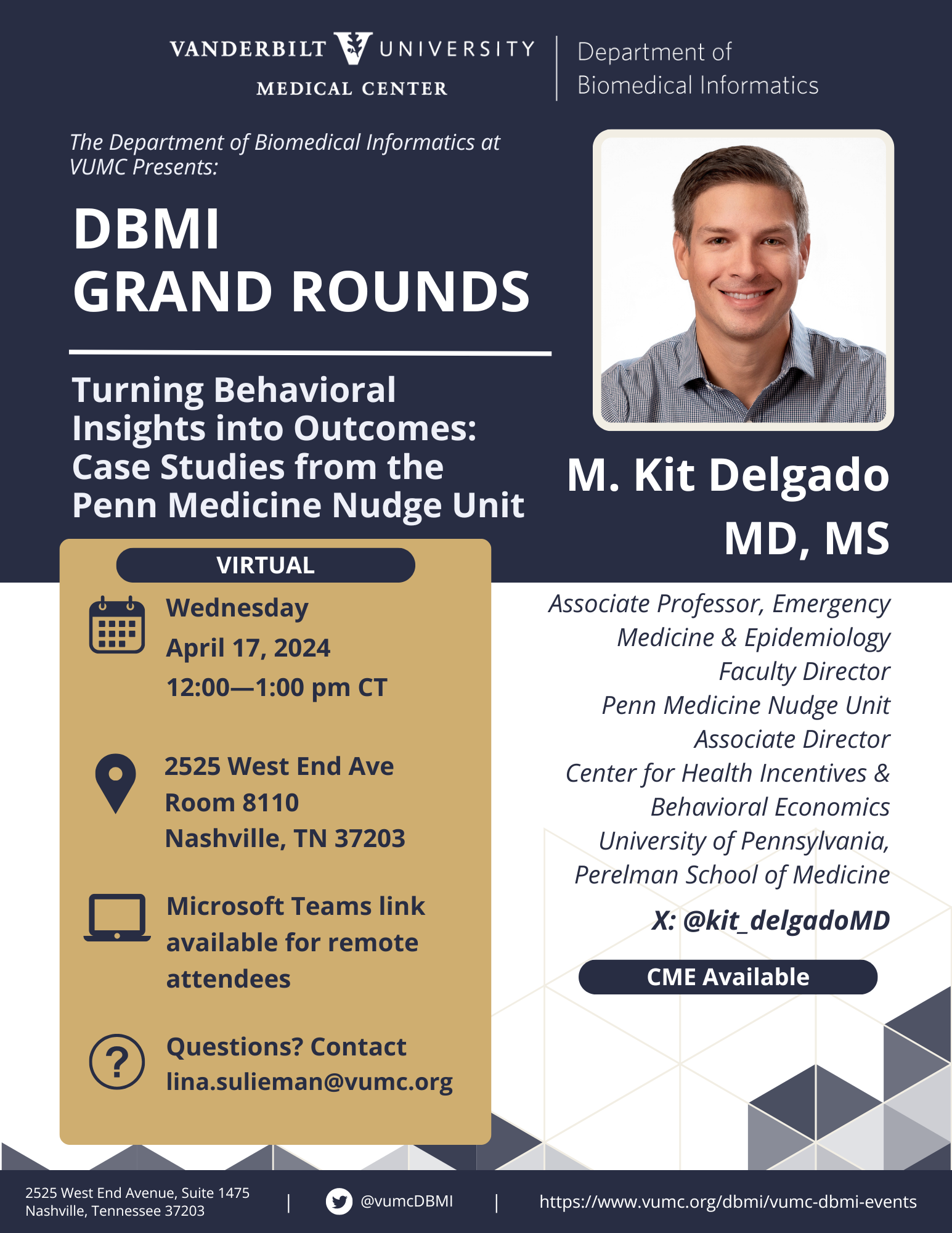
DBMI Grand Rounds: Wednesday, April 10, 2024:
Speaker: Cathy Ivory, PhD, RN, RN-BC, RNC-OB, NEA-BC, FAAN, Associate Professor and Associate Nurse Executive in Nursing Excellence, Vanderbilt University School of Nursing
Talk Title: "Evidence Informed Informatics and Thinking Differently about Technology Decisions"
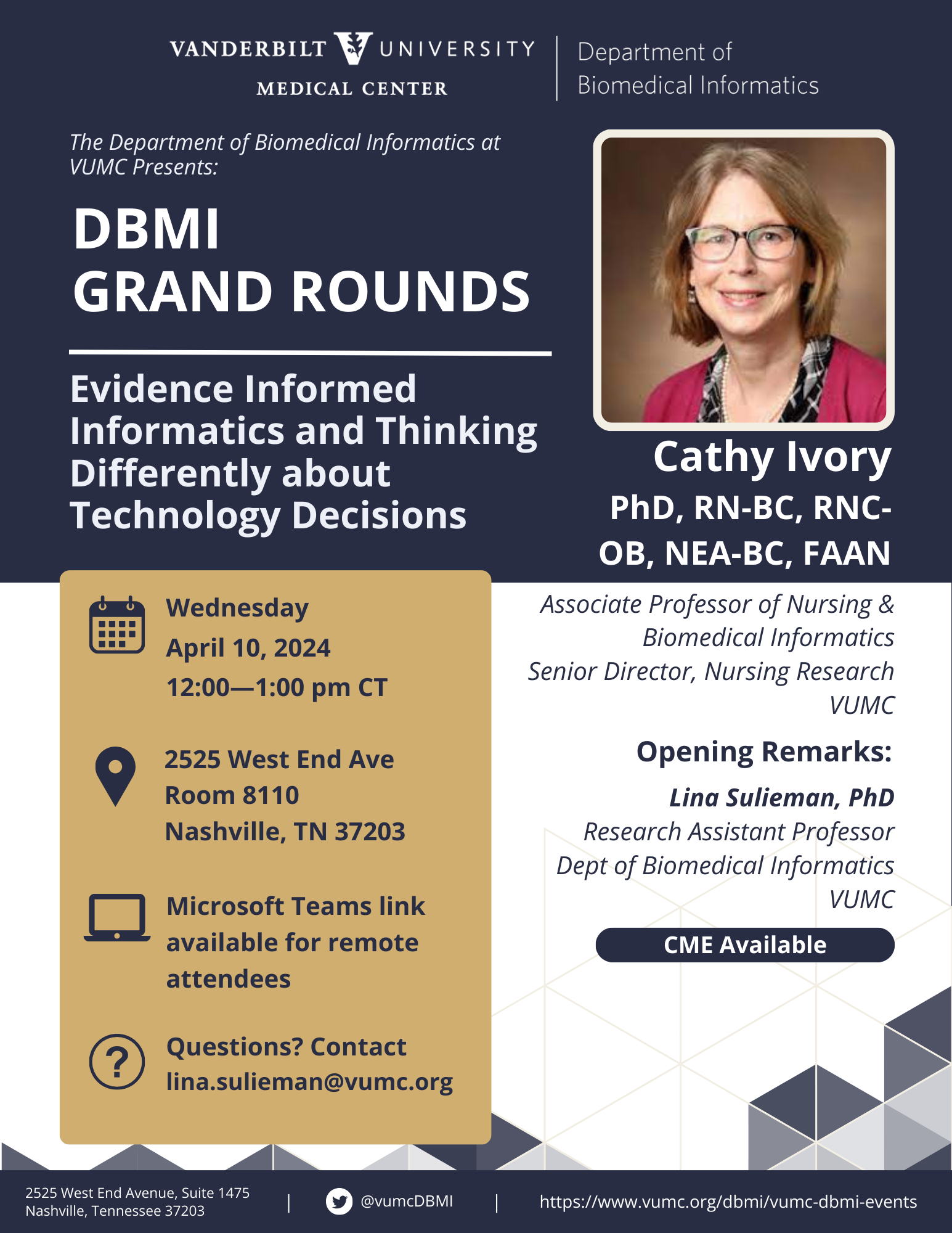
DBMI Grand Rounds: Wednesday, April 3, 2024:
Speaker: Nigam Shah, MBBS, PhD, Professor of Medicine at Stanford University and Chief Data Scientist at Stanford Health Care
Talk Title: "Shaping the Responsible Adoption of AI in Healthcare"
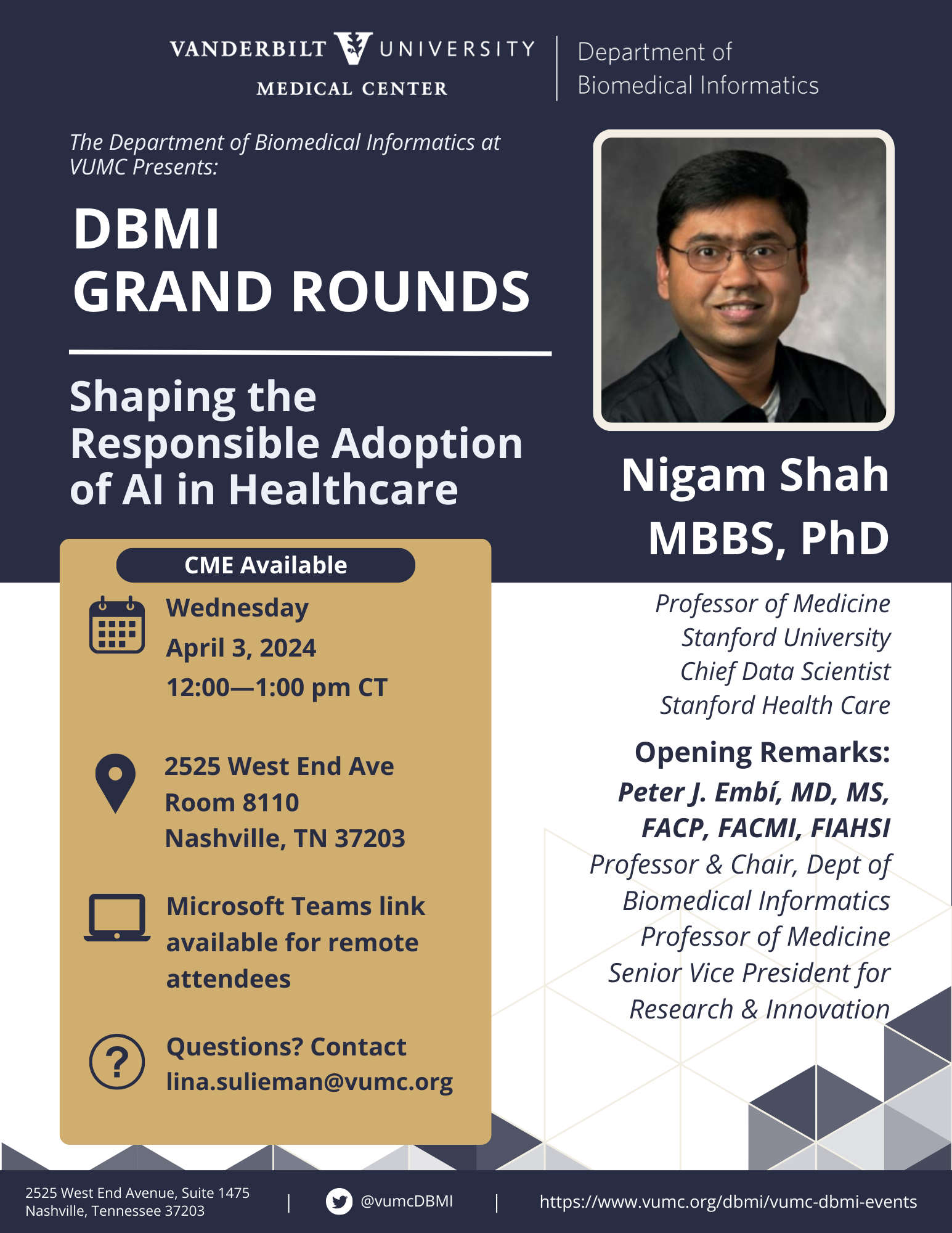
DBMI Grand Rounds: Wednesday, March 20, 2024:
Speaker: Jessica Ancker, PhD, MPH, FACMI, Professor of Biomedical Informatics and Vice Chair for Educational Affairs, Department of Biomedical Informatics; Professor of Health Policy at VUMC.
Talk Title: "Evaluations of Telehealth in Primary Care during the COVID Public Health Emergency"
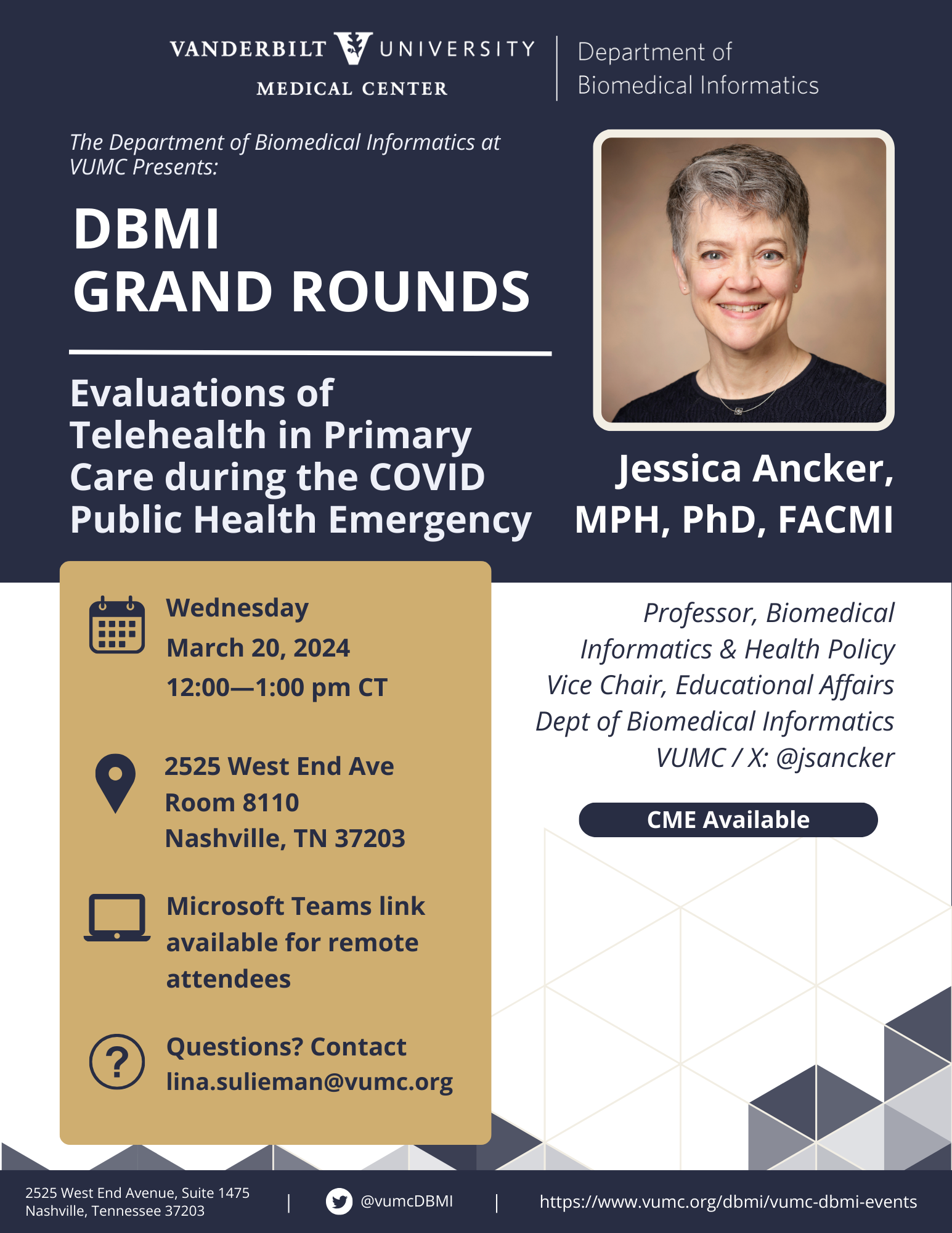
ADVANCE Center Launch Event: Friday, March 8, 2024:
Join the Department of Biomedical Informatics at Vanderbilt University Medical Center for the launch of its new "ADVANCE" Center, hosted by Co-Directors Peter Embi, MD, MS, and Bradley Malin, PhD. There will be presentations and panel discussions from 2:00 to 3:15 pm CT, followed by a networking reception from 3:15 pm to 4:30 pm CT.
RECORDING AVAILABLE HERE (Available to VUMC employees only)
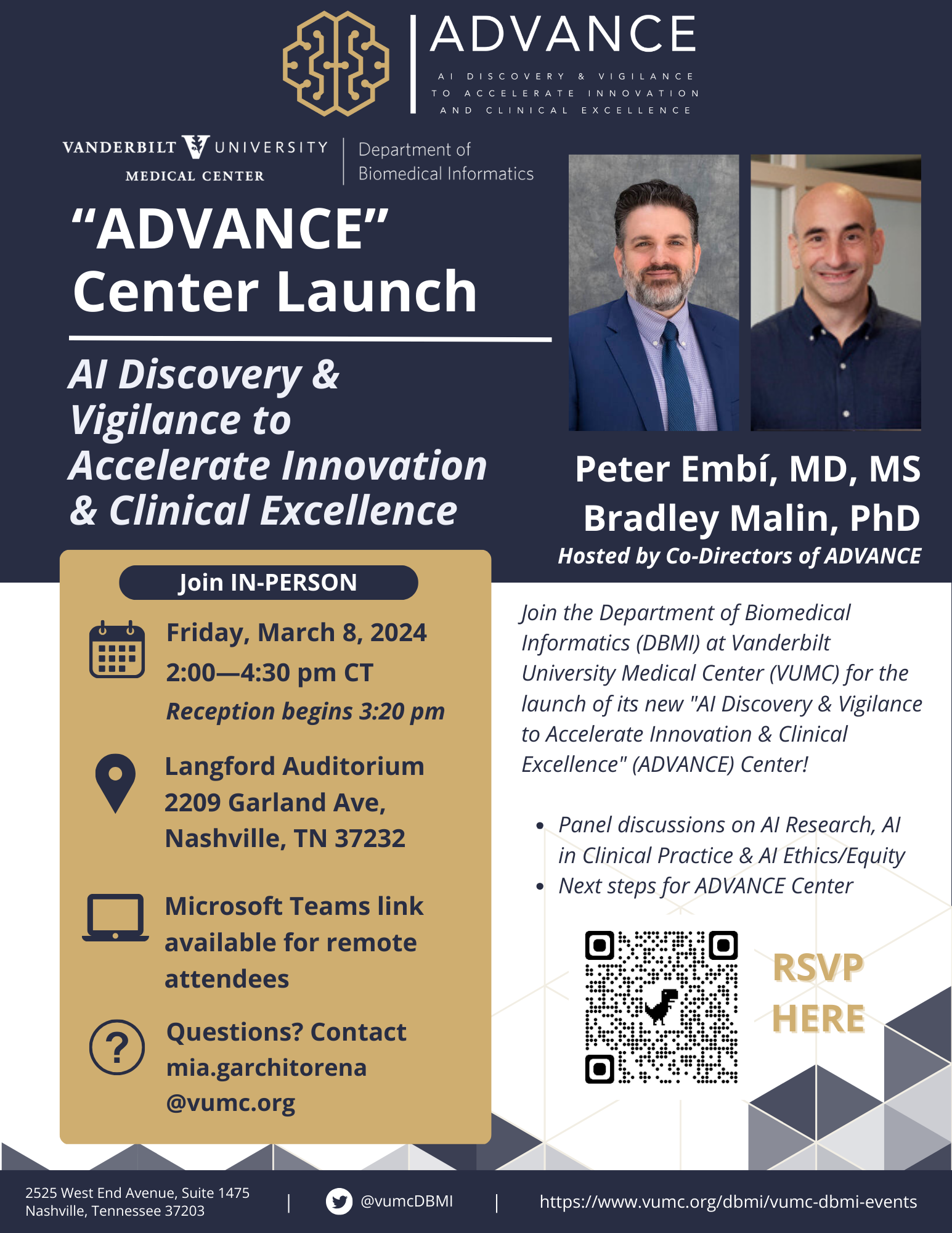
DBMI Grand Rounds: Wednesday, March 6, 2024:
Speaker: Lindsey Knake, MD, MS, Assistant Professor and Associate Chief Health Information Officer of Pediatrics, University of Iowa Stead Family Children's Hospital
Talk Title: "A Guide to Exploring Epic's Cosmos Universe: Insights from Studying Tiny Babies"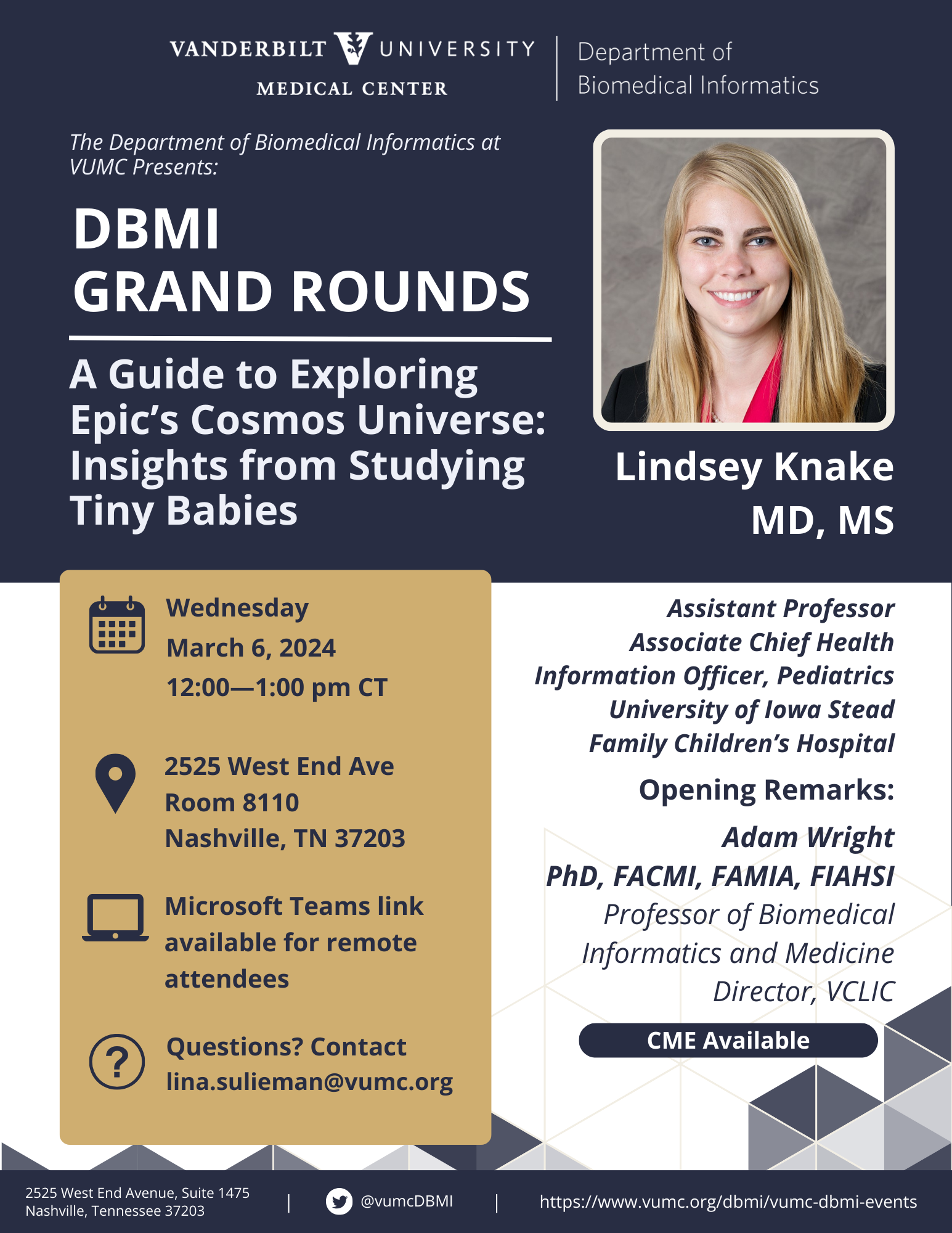
DBMI Grand Rounds: Wednesday, February 28, 2024:
Speakers: Tara B. Horr, MD, Assistant Professor in the Division of Geriatric Medicine, Department of Medicine at Vanderbilt University Medical Center; Director, Vanderbilt Home-based Hospice & Palliative Care; Founding Medical Director, Vanderbilt Hospital-at-Home; Outpatient Clinical Service Chief, Division of Geriatric Medicine; Chief Medical Advisor, Vanderbilt Home Care Services; Michelle Lewis, MD, Assistant Professor of Clinical Medicine, Section of Hospital Medicine at VUMC
Talk Title: "Vanderbilt Hospital at Home, Building a Hospital Without Walls"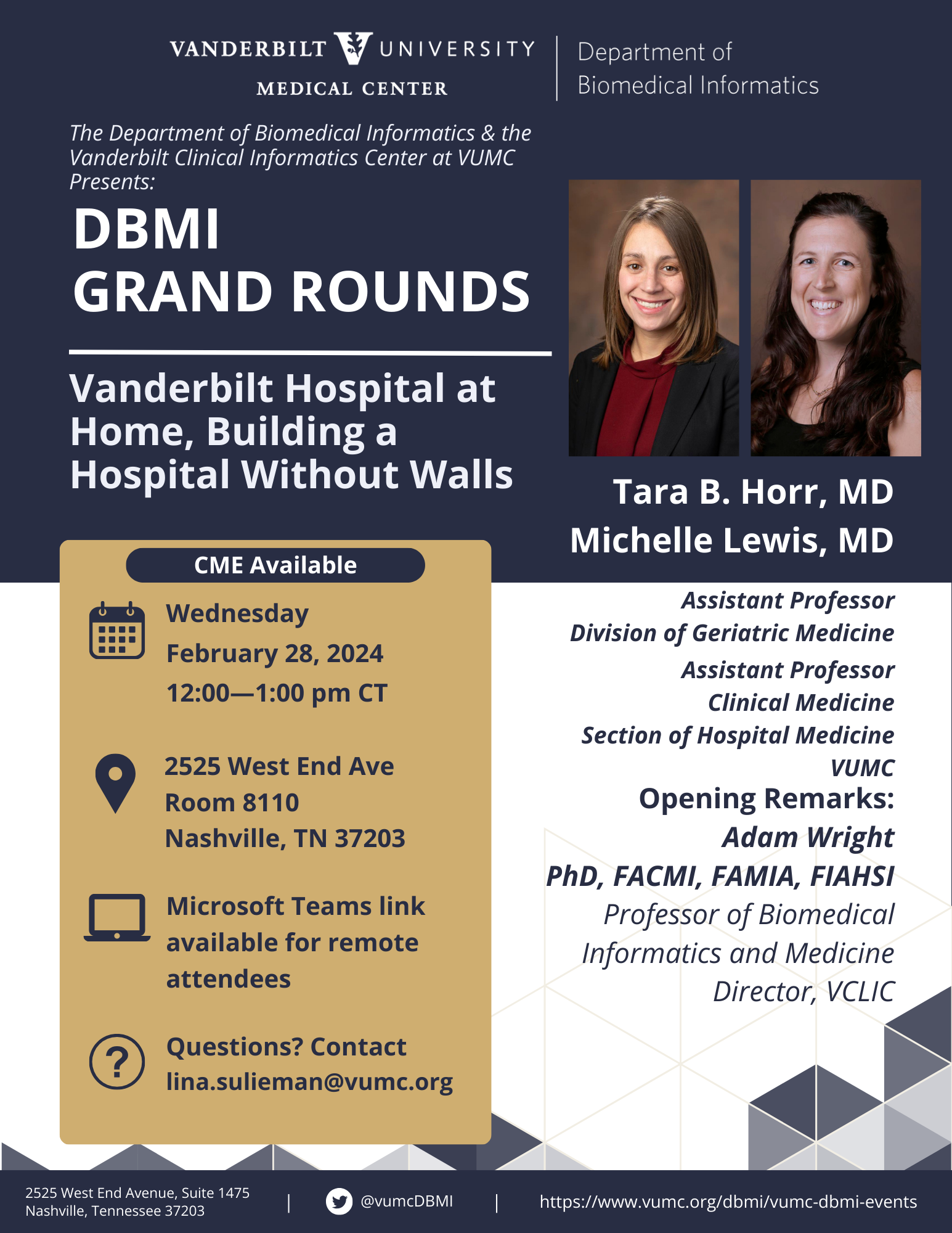
DBMI Special Seminar: Tuesday, February 13, 2024:
Speaker: Alvin Jeffery, PhD, RN-BC, CCRN-K, FNP-BC, Assistant Professor, Vanderbilt University School of Nursing & DBMI
Talk Title: "From Databases to Decision-Making: An Early Career Scientist's Journey in Clinical Prediction, Probabilistic Phenotyping, and Information Visualization"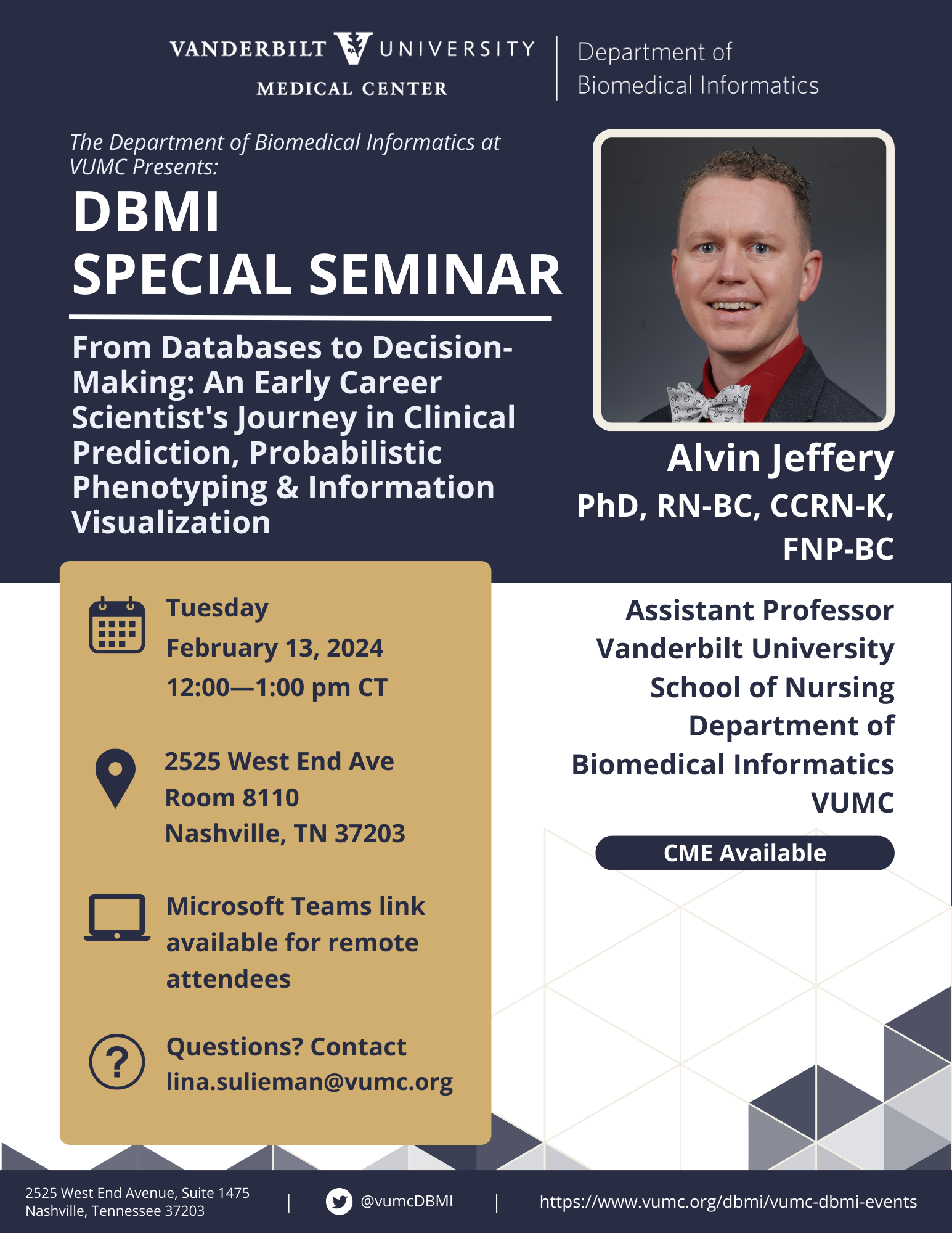
DBMI/VCLIC Grand Rounds: Wednesday, February 7, 2024:
Speaker: Vanderbilt Clinical Informatics Center (VCLIC) team
Title: "VUMC Clinical Informatics Update"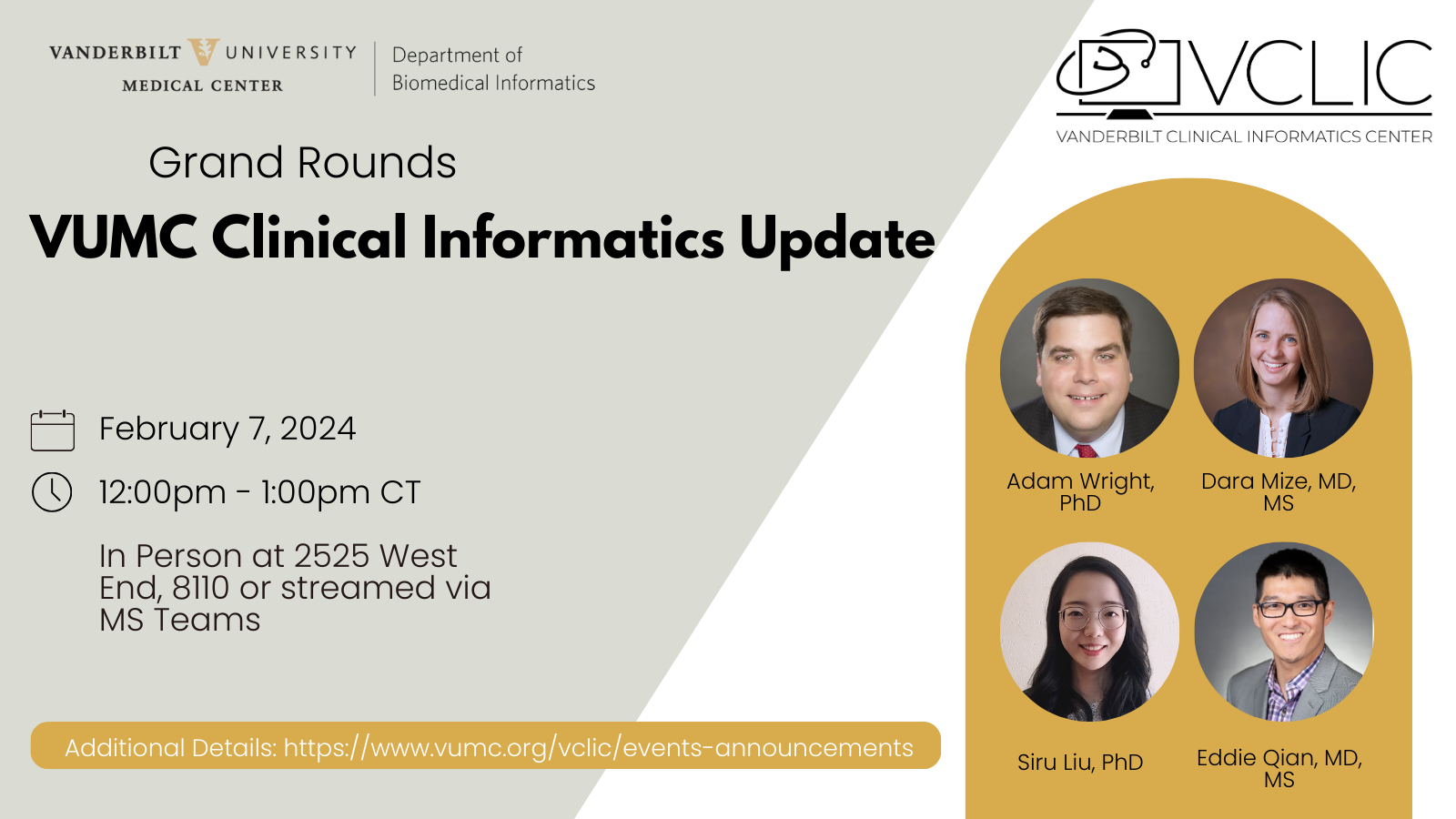
DBMI Grand Rounds: Wednesday, January 31, 2024:
Speaker: Daniel Stein, MD, MBA, Chief Executive Officer & Founder of Embold Health (Nashville)
Talk Title: "Driving Innovation through Physician Quality"WATCH A RECORDING HERE (for internal VUMC audiences only)
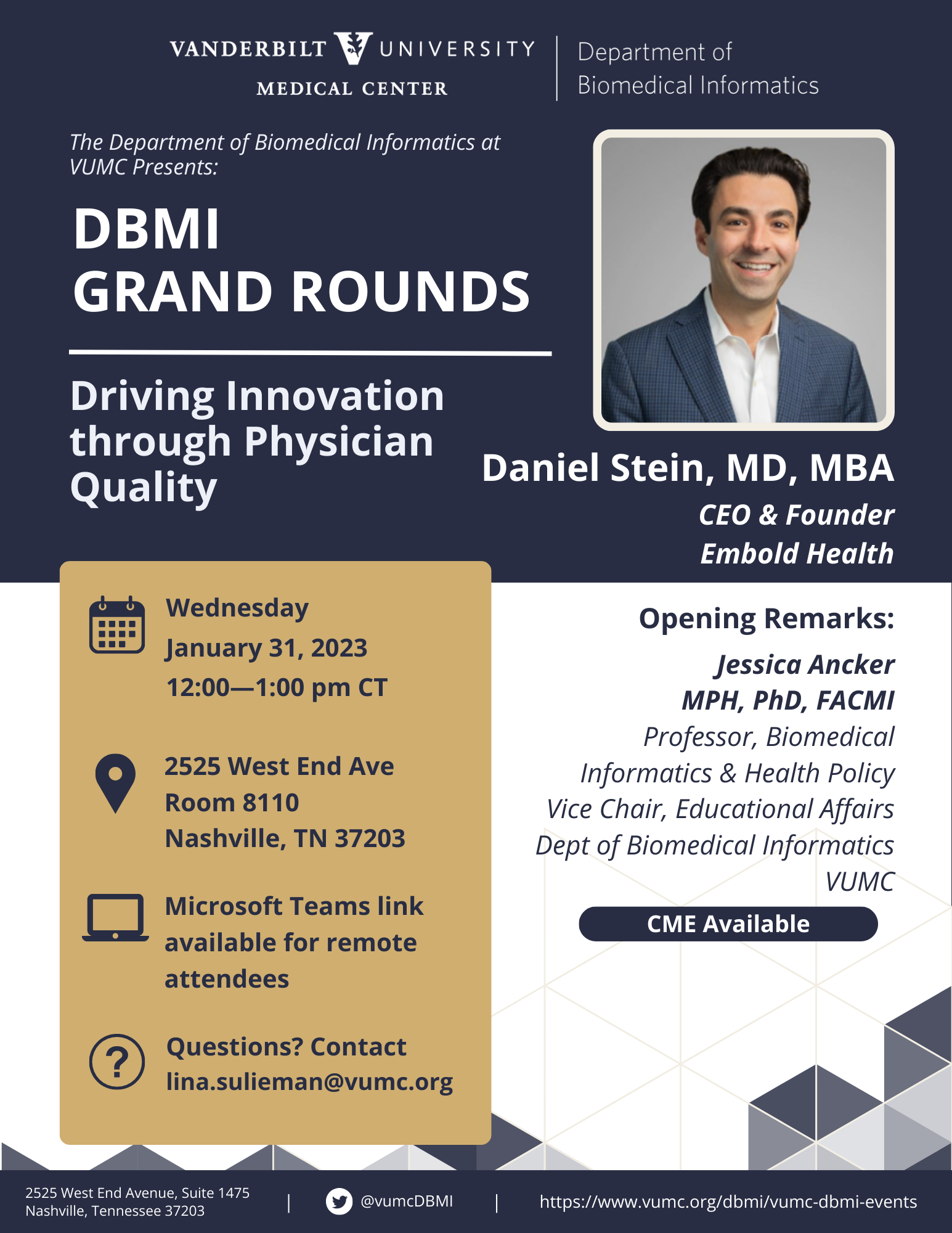
DBMI Grand Rounds: Wednesday, January 24, 2024:
Co-Sponsored by the Department of Biostatistics at VUMC
Speaker: Anru Zhang, PhD, Eugene Anson Stead, Jr. MD Associate Professor; Associate Professor of Biostatistics & Bioinformatics, Computer Science, Statistical Science at Duke University School of Medicine
Title: "Time-Aware Analyses for Critical Care Electronic Health Records"WATCH A RECORDING HERE (for internal VUMC audiences only)
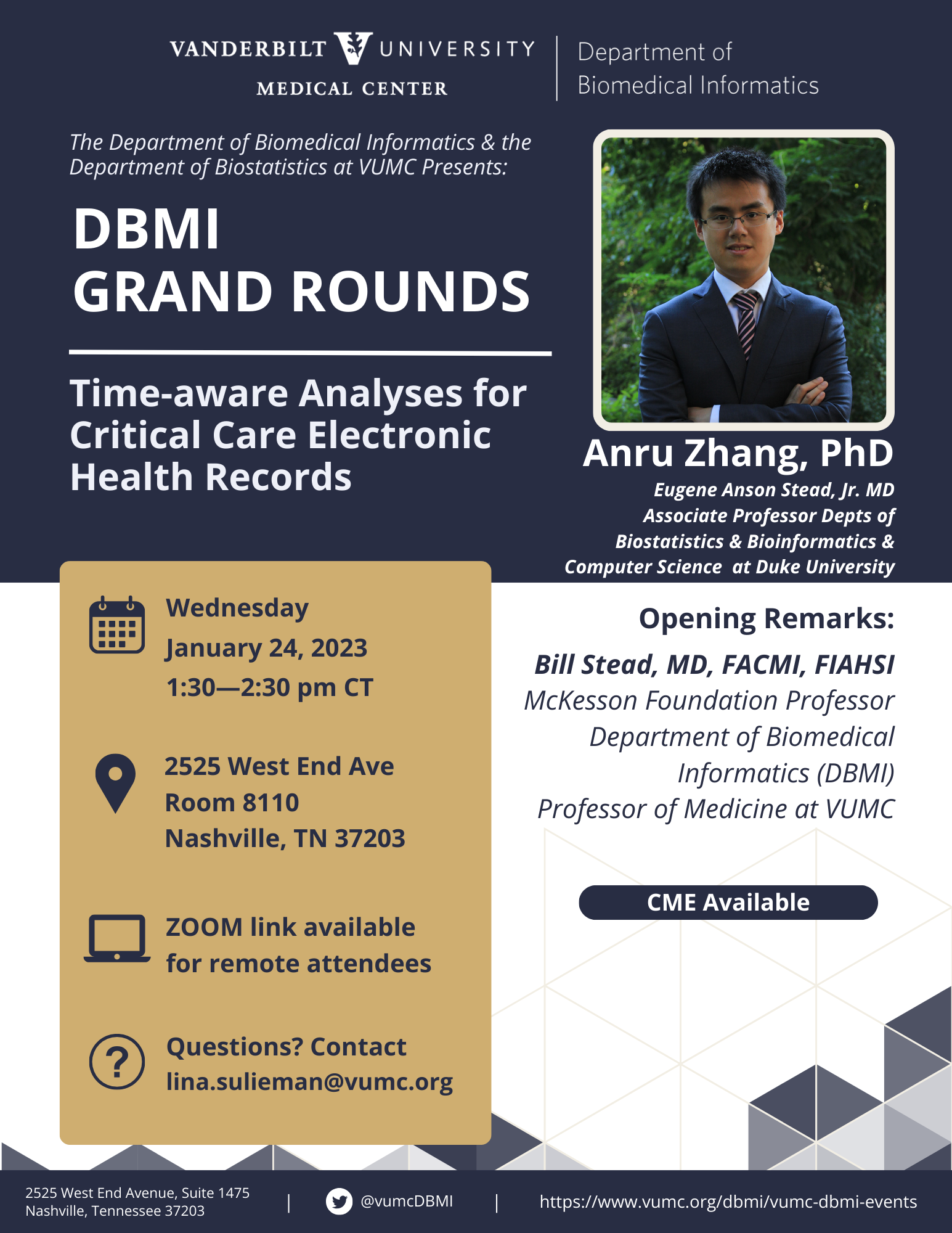
-
DBMI Special Seminar - Thursday, December 14, 2023:
Speaker: Chao Yan, PhD, Postdoc in DBMI
Title: "Maximizing the Utility of EHRs and Usage Data Through Insights and Innovations"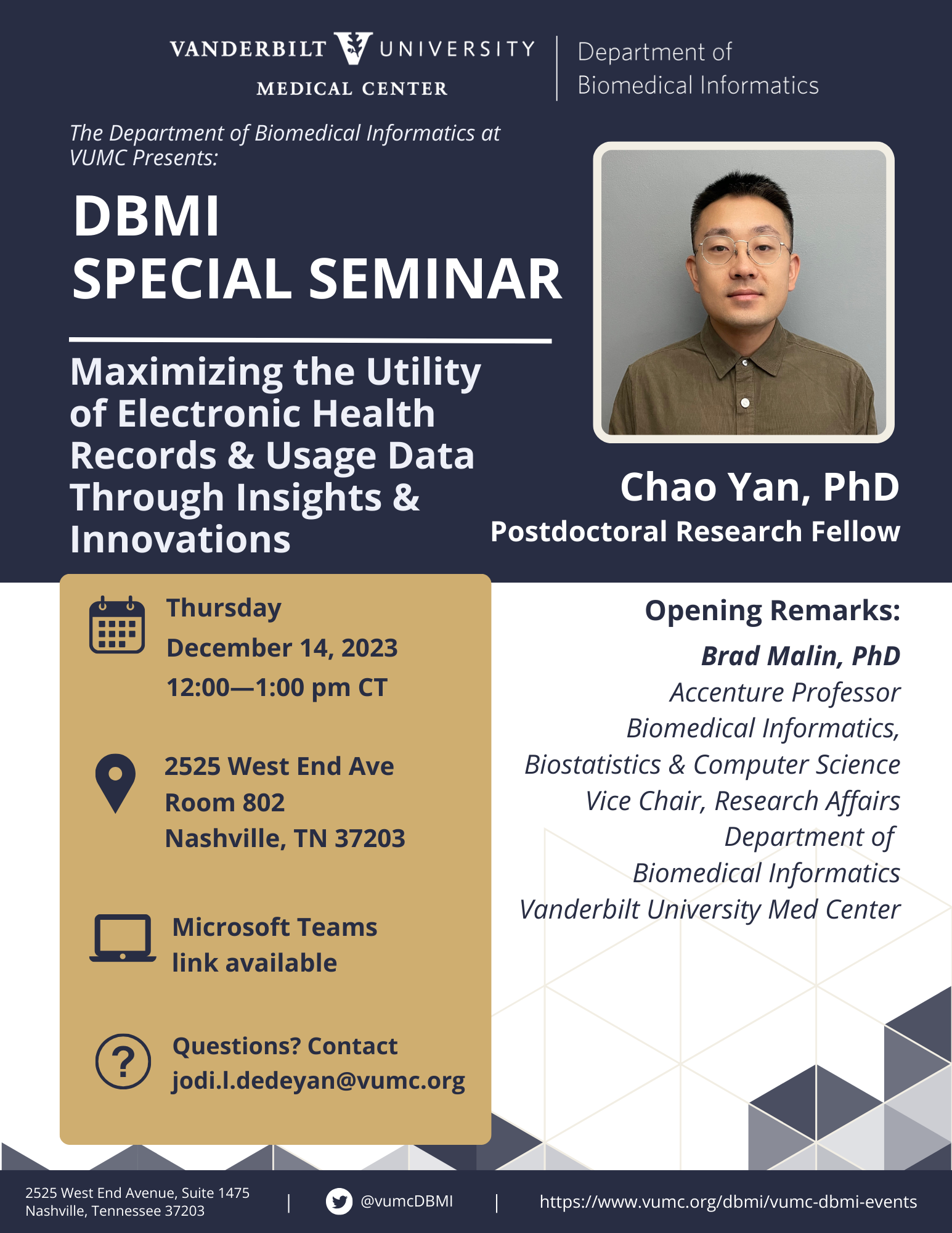
DBMI/Ethics Grand Rounds - Wednesday, December 13, 2023:
Speaker: Peter Embi, Yaa Kumah-Crystal, Brad Malin, Susannah Rose; Moderator: Ellen Clayton
Title: "Ethical Implications of AI in Clinical Care and Research"DBMI Grand Rounds - Wednesday, December 6, 2023:
Speaker: John Halamka, MD, MS, President of the Mayo Clinic Platform
Title: "Platform Transformation in Healthcare"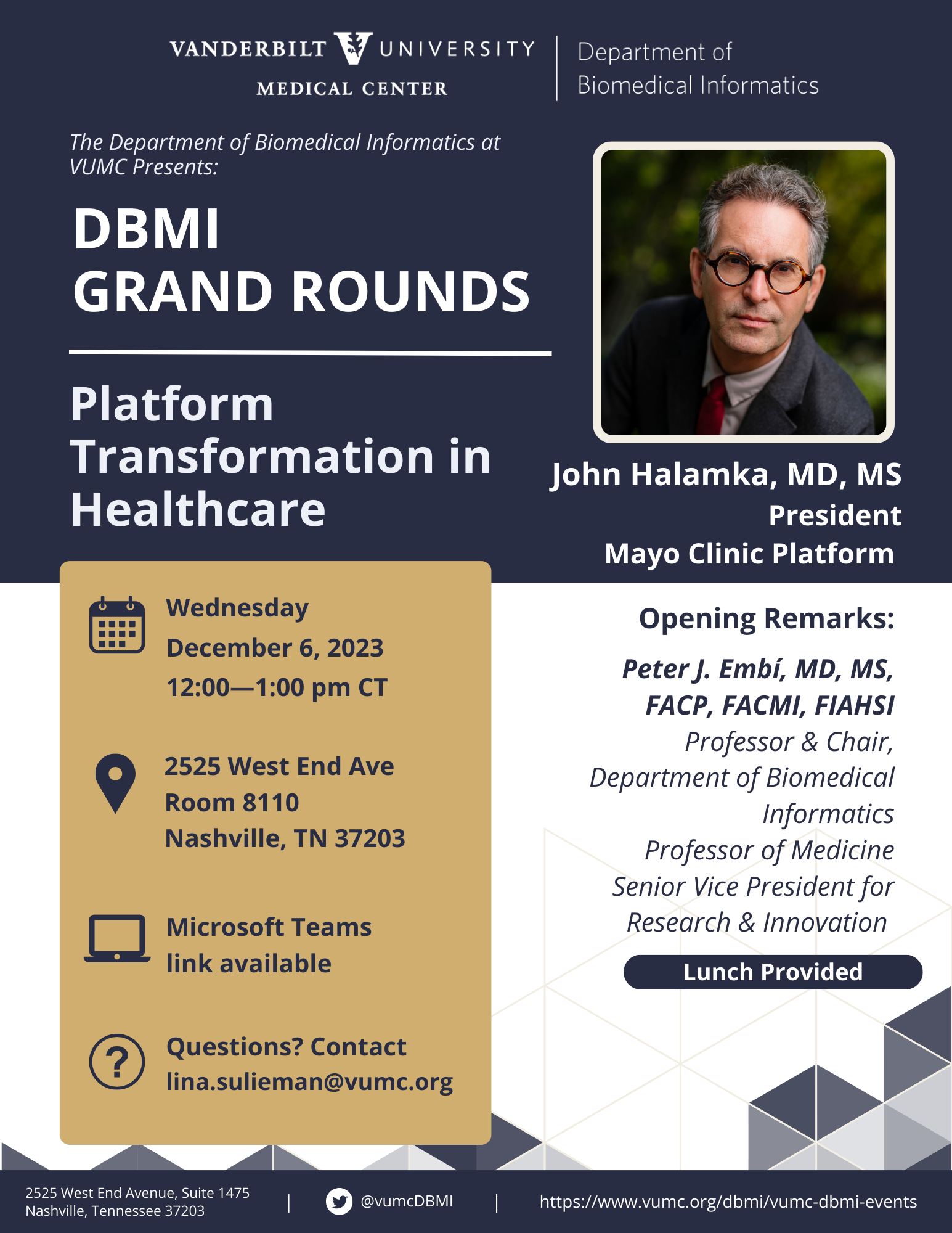
DBMI Special Seminar - Thursday, November 30, 2023:
Speaker: Katherine Musacchio Schafer, PhD, MS, MEd, Postdoctoral Research Fellow, VA Quality Scholars
Title: "Developing Treatment Recommendation Systems: A Study within Suicide Prevention"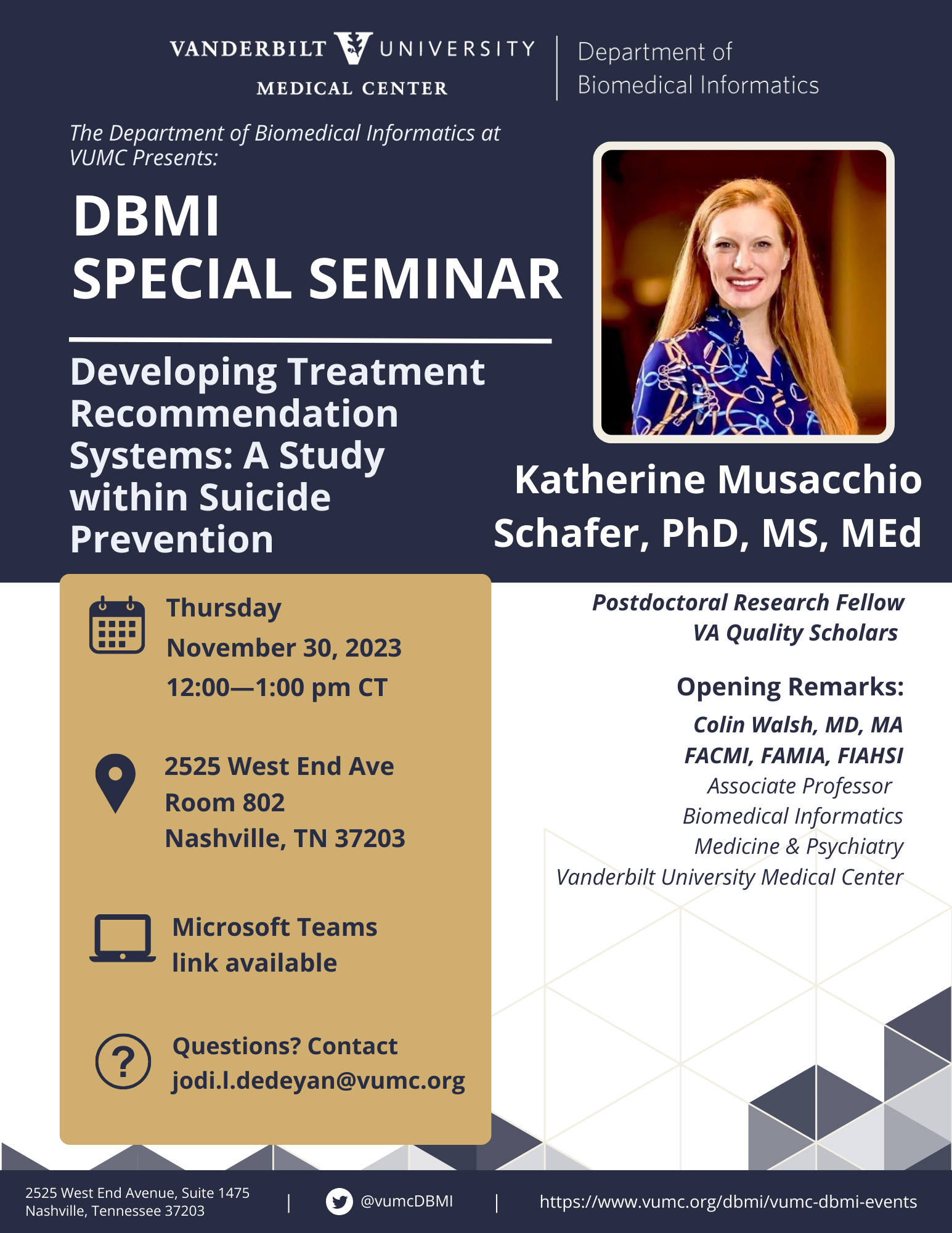
DBMI Grand Rounds - Wednesday, November 8, 2023:
Speakers: Kate Clouse, PhD, MPH, Associate Professor, Vanderbilt University School of Nursing
Title: "Real-World Implementation of a Location-Based Smartphone App to Improve Postpartum Engagement in HIV Care in South Africa"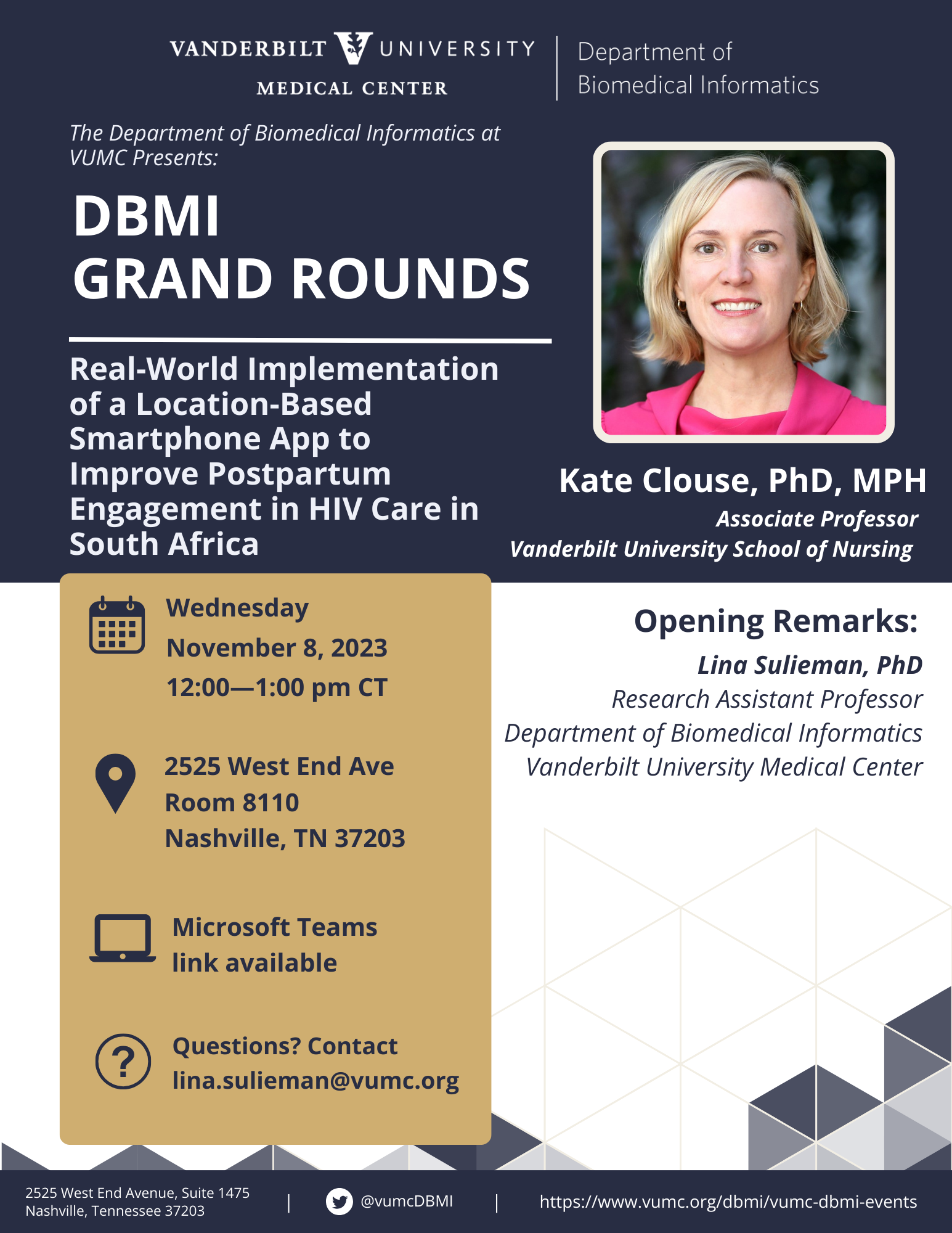
DBMI / VCLIC Grand Rounds - Wednesday, November 1, 2023:
Speakers: Craig Joseph, MD; Jerome Pagani, PhD
Title: "Designing for Health"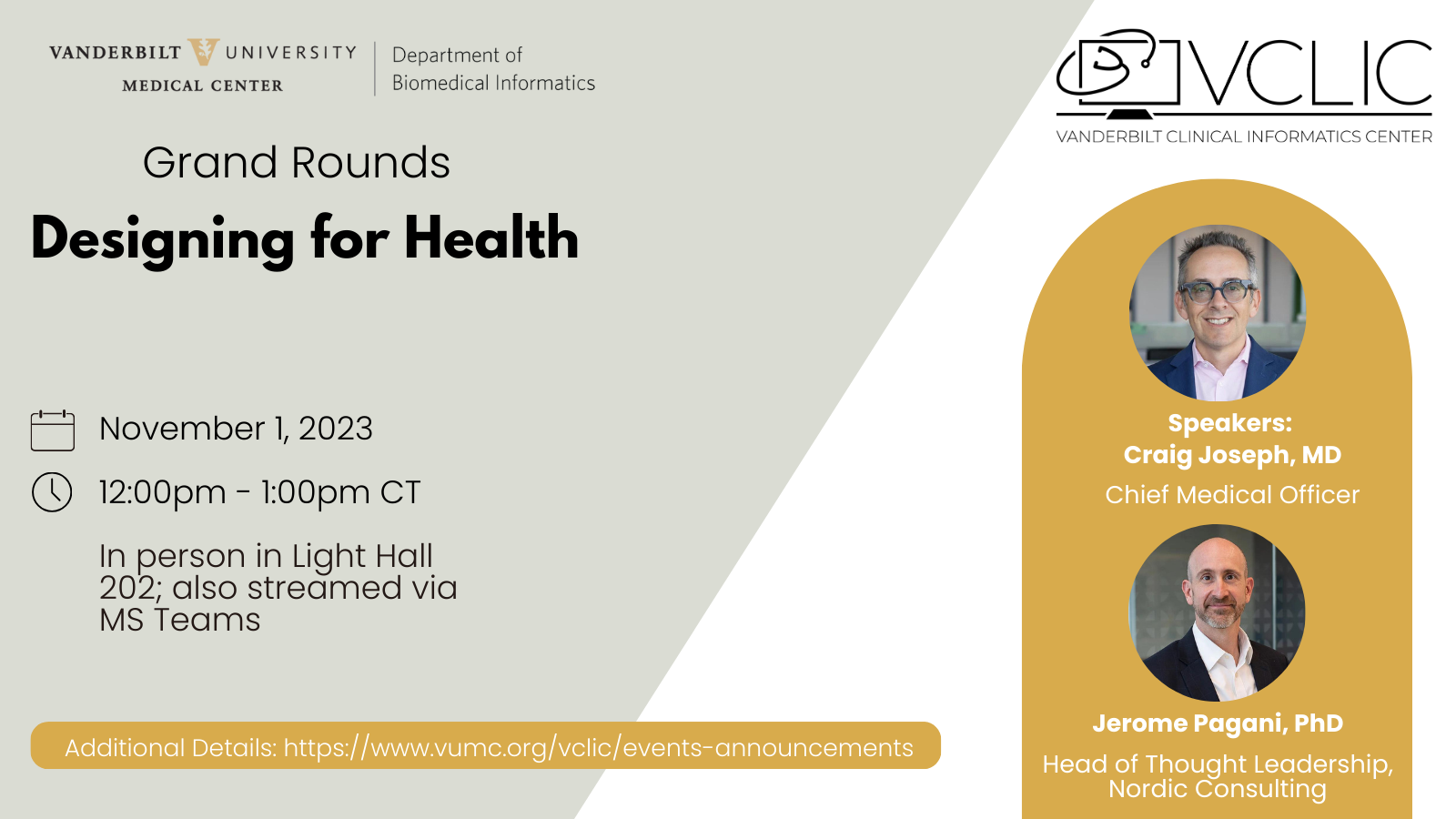
DBMI Grand Rounds - Wednesday, October 25, 2023:
Speaker: Matt Weinger, MD, MS
Title: "Current Concepts in Patient Safety for Clinicians & Informaticians"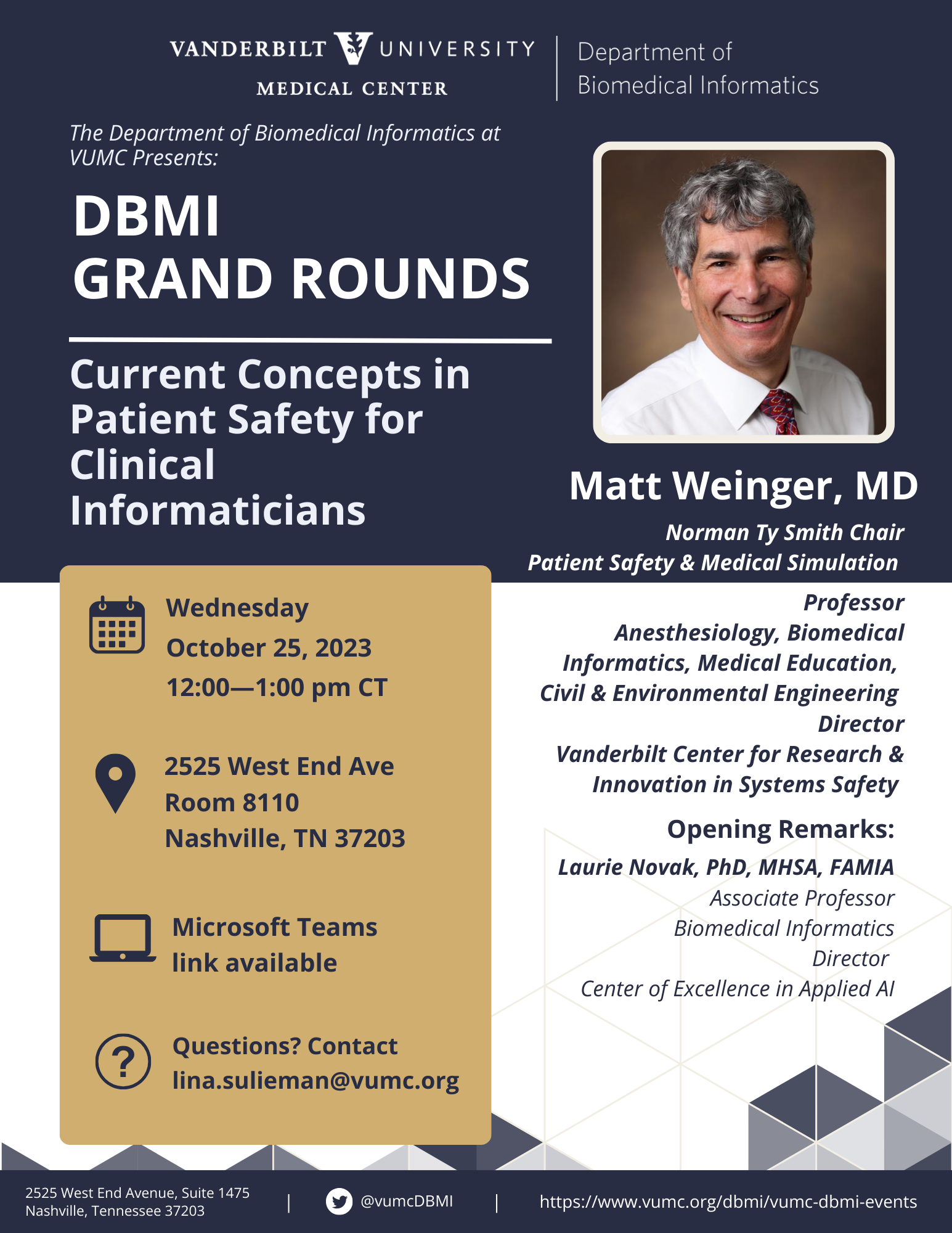
DBMI Grand Rounds - Wednesday, October 11, 2023:
Speaker: Micky Tripathi, PhD, MPP
Title: "Update from the National Coordinator: Enabling FHIR Exchange"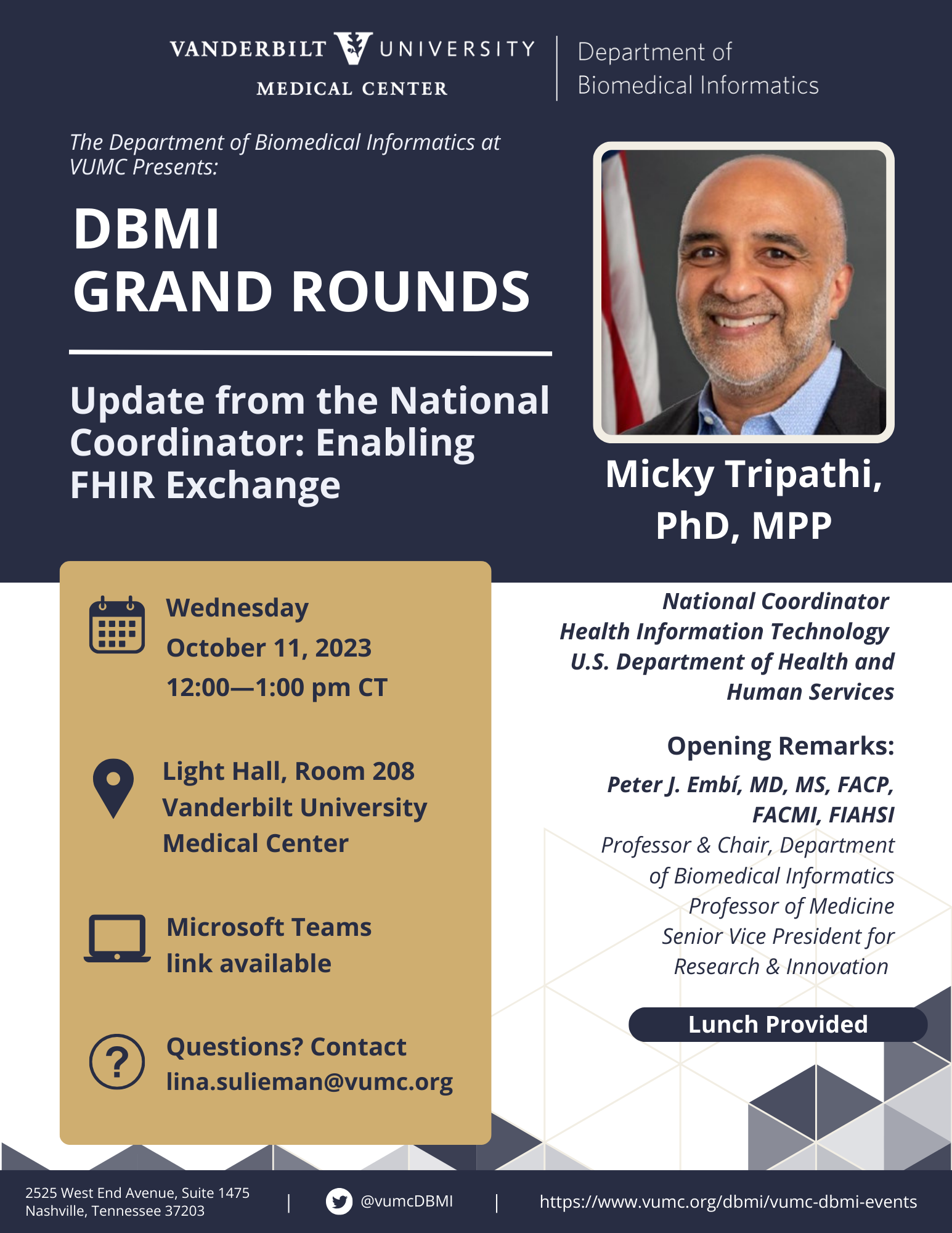
DBMI Grand Rounds - Wednesday, October 4, 2023:
Title: "Opportunities and Challenges in the Use of AI/ML in Population Health Informatics"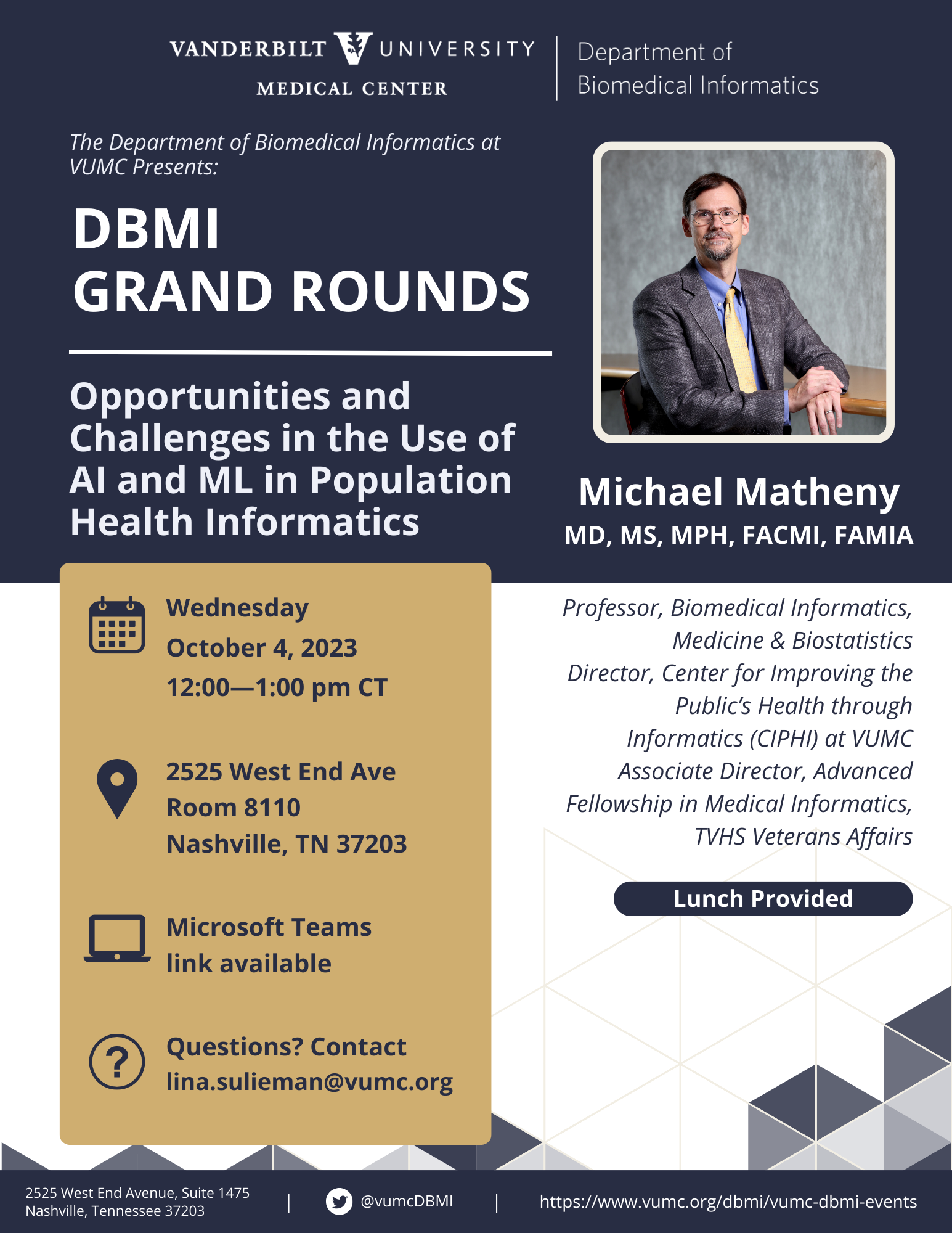
Michael Matheny, MD, MS, MPH, FACMI, FAMIA
Professor of Biomedical Informatics, Medicine & Biostatistics
Director, Center for Improving the Public's Health through Informatics (CIPHI)WEDNESDAY, September 13, 2023
12:00 - 1:00 PM CTSpeaker: Ethan Gershon, MD
Title: "The EHR Vendor Viewpoint"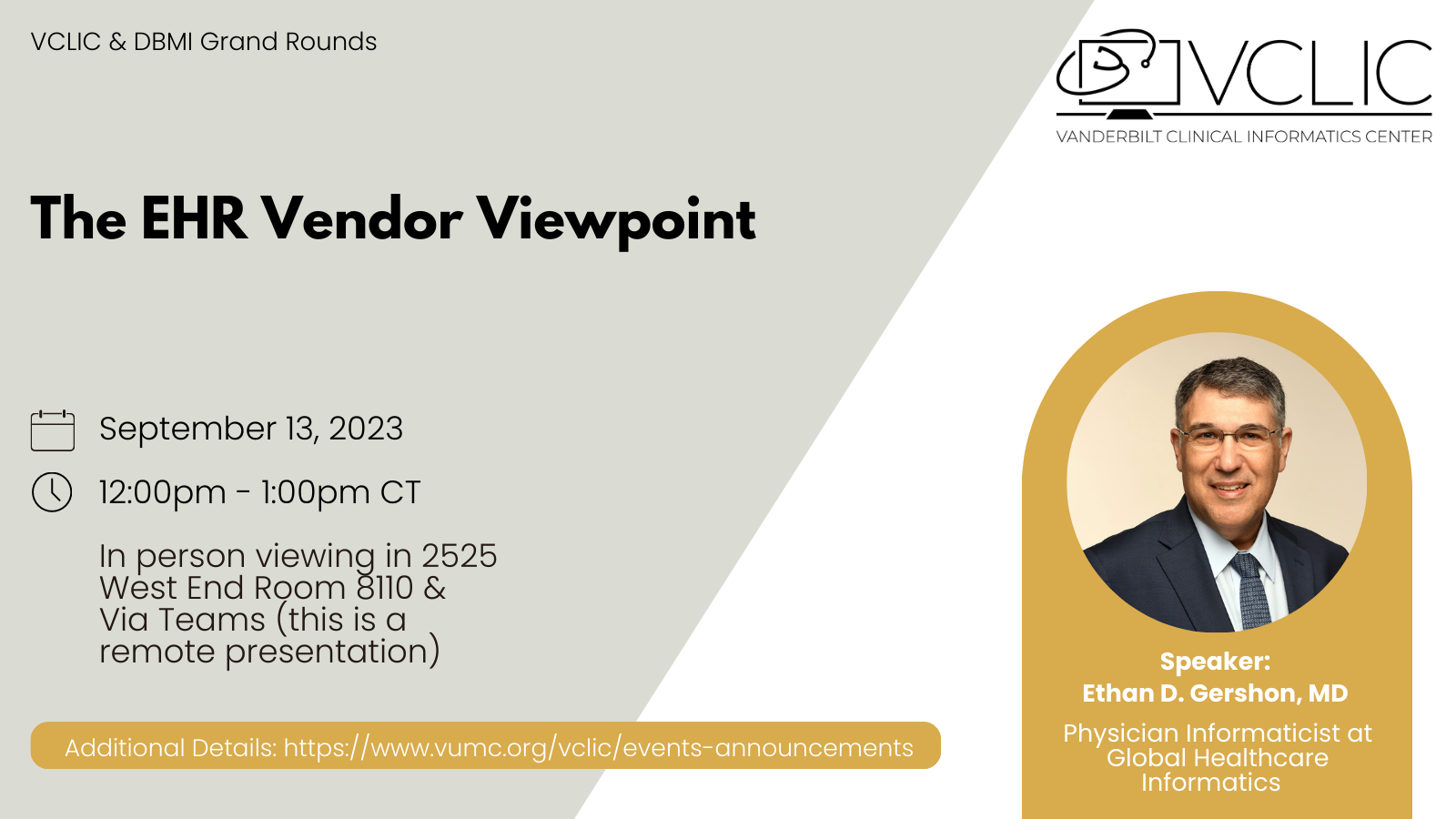
-
WEDNESDAY, April 5, 2023
12:00 - 1:00 PM CTEvent Type: Vanderbilt Clinical Informatics Center (VCLIC) Seminar
Title: "National Strategies, Priorities, and Challenges to Reducing Documentation Burden and Evaluating Impact"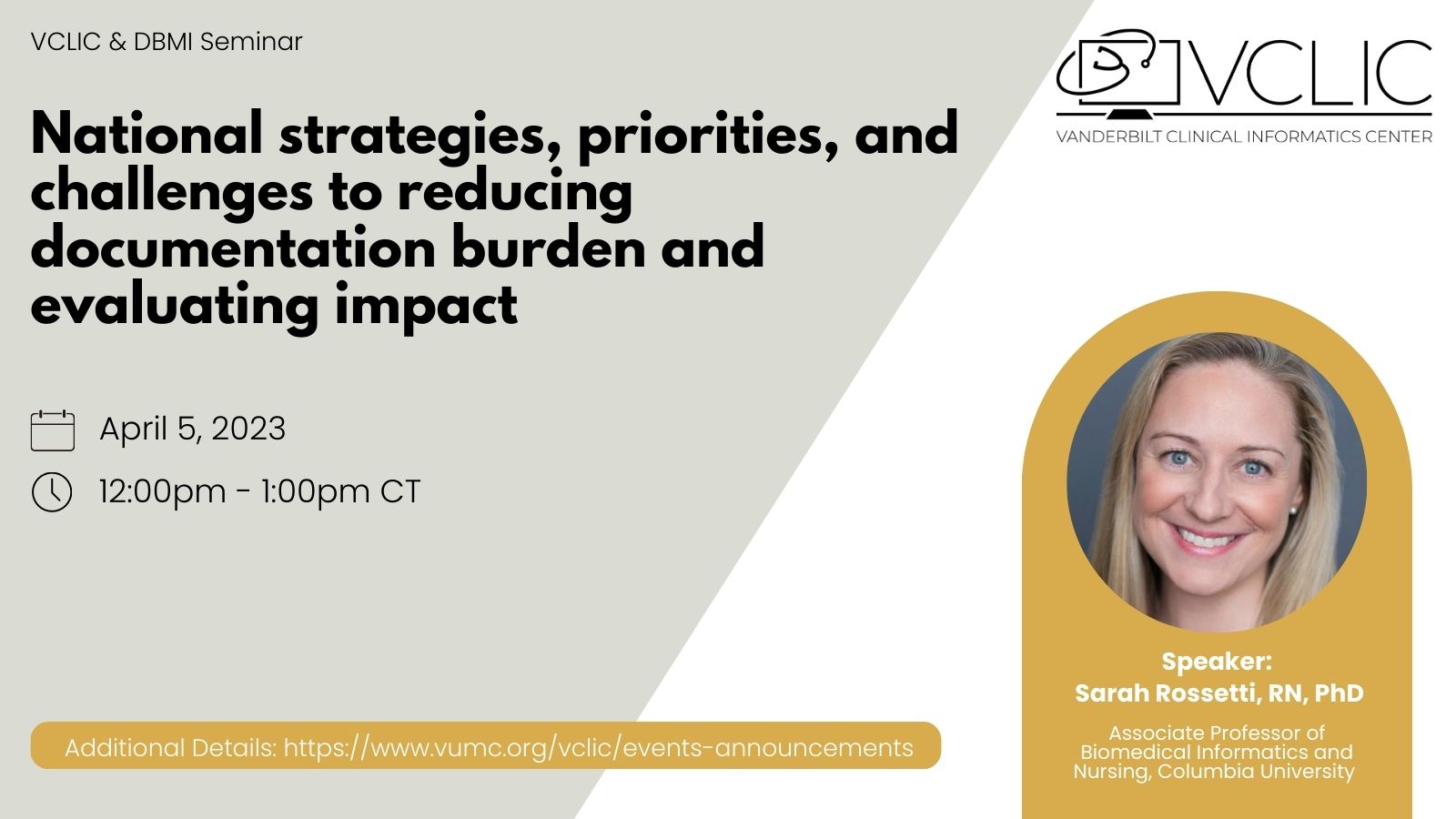
Sarah Rossetti, RN, PhD
Associate Professor of Biomedical Informatics and Nursing
Columbia UniversityWEDNESDAY, MARCH 29, 2023
12:00 - 1:00 PM CTSpeaker: Charles Friedman, PhD
Title: "Sociotechnical Infrastructure for Realizing a Robust Learning Health System"
WEDNESDAY, February 8, 2023
Speaker: Eric Venner, PhD
Title: "Implementing Genomic Medicine at the HGSC"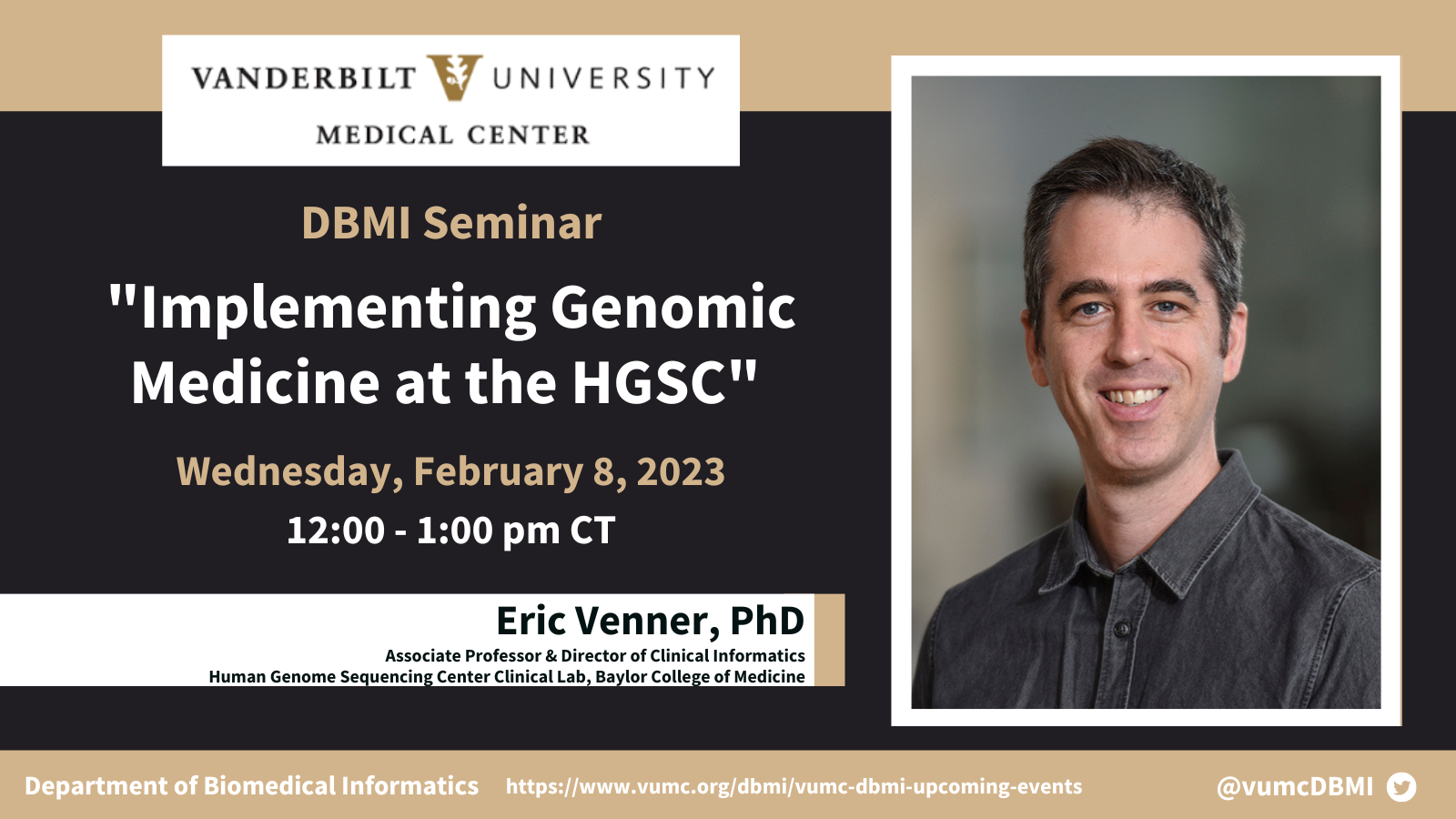
WEDNESDAY, February 1, 2023
12:00 - 1:00 PM CTSpeaker: Adam Wright, PhD, FACMI, FAMIA, FIASHI
Title: "Update on Clinical Informatics at Vanderbilt"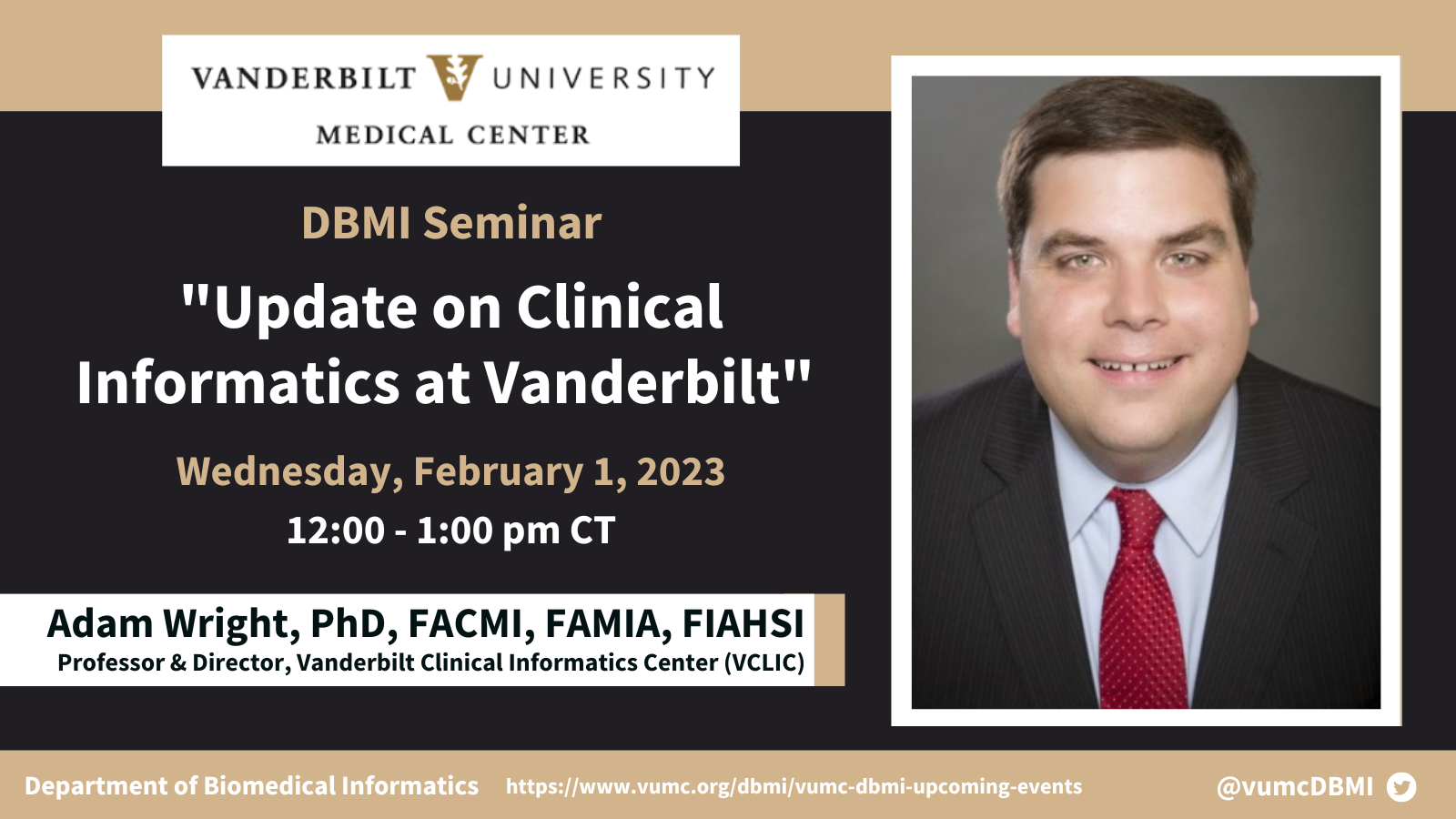
THURSDAY, JANUARY 26, 2023
11:00 am - 12:00 pm CST
Event Type: DBMI Special Seminar
Title: "Augmenting Postoperative Transitions of Care"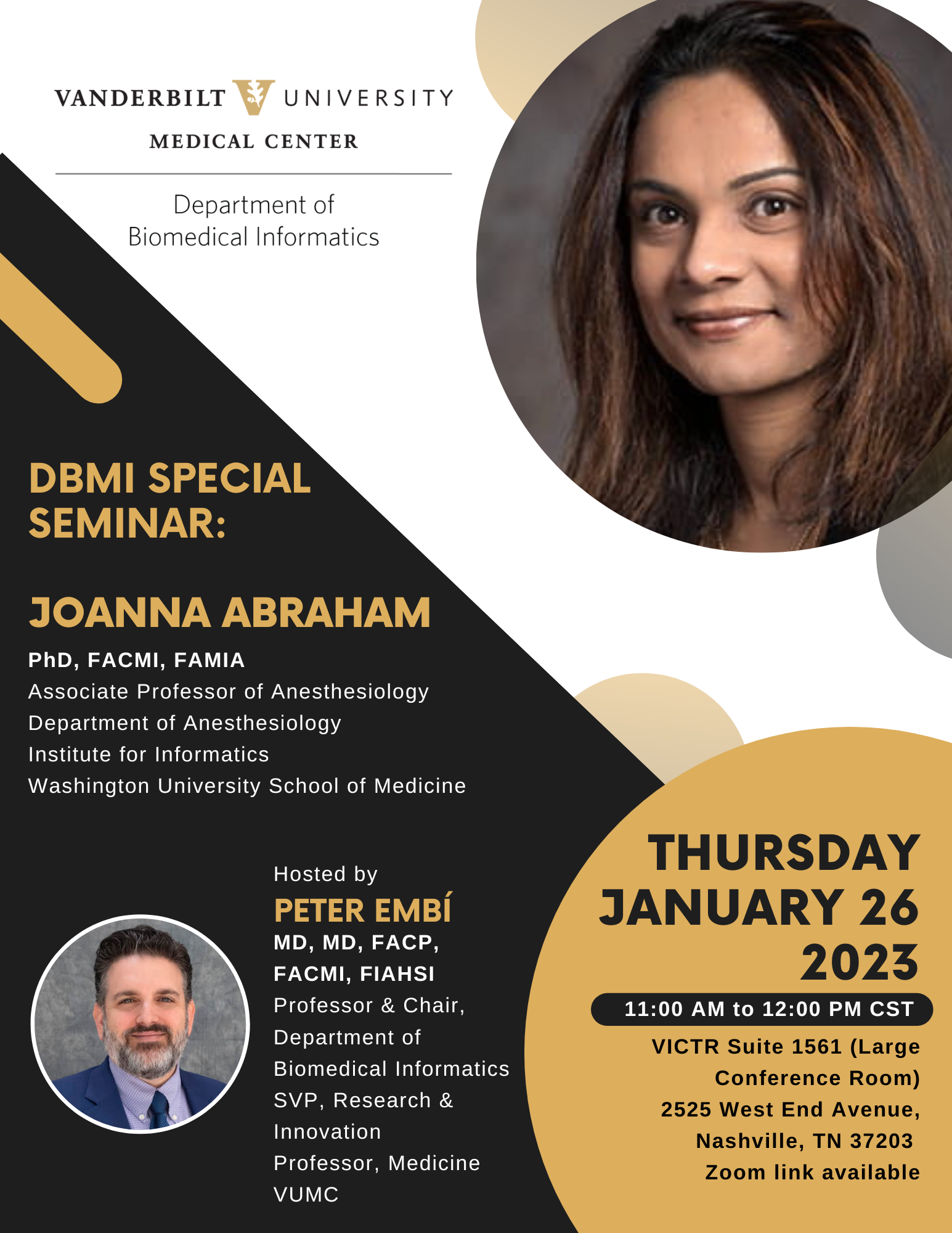
Joanna Abraham, PhD, FACMI, FAMIA
Associate Professor
Department of Anesthesiology and the Institute for Informatics
Washington University School of MedicineAbstract:
In this talk, I will discuss my ongoing research on postoperative patient care transitions. Informed by contextual inquiry approaches and mixed methods, we conducted a series of studies to investigate the current operating room to ICU handoff workflow and to develop design requirements for a socio-technical handoff tool. This handoff tool is augmented by machine learning predictions of patient risks of postoperative complications and by perioperative telemedicine teams to support resilience to communication errors. I will discuss the planned trial and new directions for safety research in perioperative medicine.Wednesday, January 25, 2023
12:00 - 1:00 PM CTEvent Type: Vanderbilt Clinical Informatics Center (VCLIC)
Title: "Turning Digital Fumes into a Breath of Fresh Air"
Julia Adler-Milstein, PhD
Professor of Medicine
Director of the Center for Clinical Informatics and Improvement Research
University of California, San FranciscoVCLIC is excited to host Julia Adler-Milstein, PhD, Professor of Medicine and Director of the Center for Clinical Informatics and Improvement Research at UCSF, on January 25th, 2023 from 12:00-1:00 pm CT. Dr. Adler-Milstein will present on Turning Digital Fumes into a Breath of Fresh Air: While EHR data is heavily used for clinical research, there is also significant potential for behavioral and social science research. In my talk, I will describe EHR event logs as a novel source of data that captures individual clinician and clinical team behaviors and give examples of how such data can be applied to address policy- and practice-based questions related to EHR user interface design, clinician burnout, and clinical process outcomes.
WEDNESDAY, January 18, 2023
12:00 - 1:00 PM CTEvent Type: DBMI Seminar
Title: "Genomic Exploration and All of Us"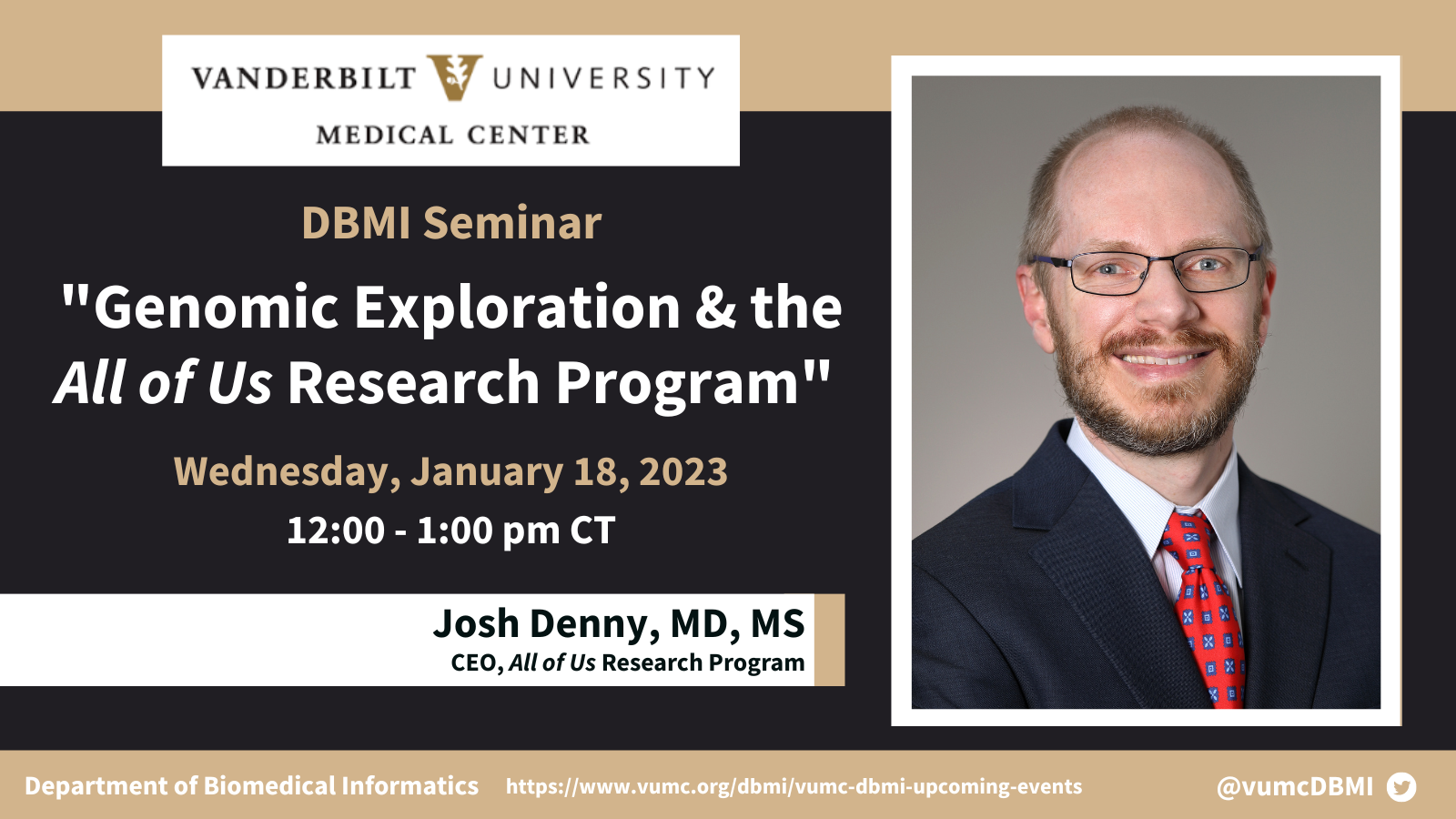
Josh Denny, MD, MS
CEO
All of Us Research Program, NIHAbstract:
The All of Us Research Program launched in May 2018 and more than 50,000 diverse participants have joined the effort, with more than 360,000 contributing biospecimens to date. Participants contribute biospecimens, health surveys, EHR data, and activity monitor data, such as Fitbit data. In May 2020, the program launched the beta version of the Researcher Workbench. Researchers can access individual-level data and suite of tools for analysis of common and rare diseases. In March 2022, the program released ~100,000 whole genomes, which has revealed nearly 600 million genetic variants observed in our population. All of Us is committed to catalyzing a robust data ecosystem that drives discovery and improves health.Learning Objectives:
- Appreciate AoU's release of 100,000+ genomes reveals above genetic variants in the population
- How this can lead to a robust data ecosystem that drives discovery and improves health
- How you can access this vast ecosystem
TUESDAY, JANUARY 10, 2023
Event Type: DBMI Special Seminar
Title: "Using Raw Audit Logs to Measure Physician Workload, Cognitive Burden and Burnout"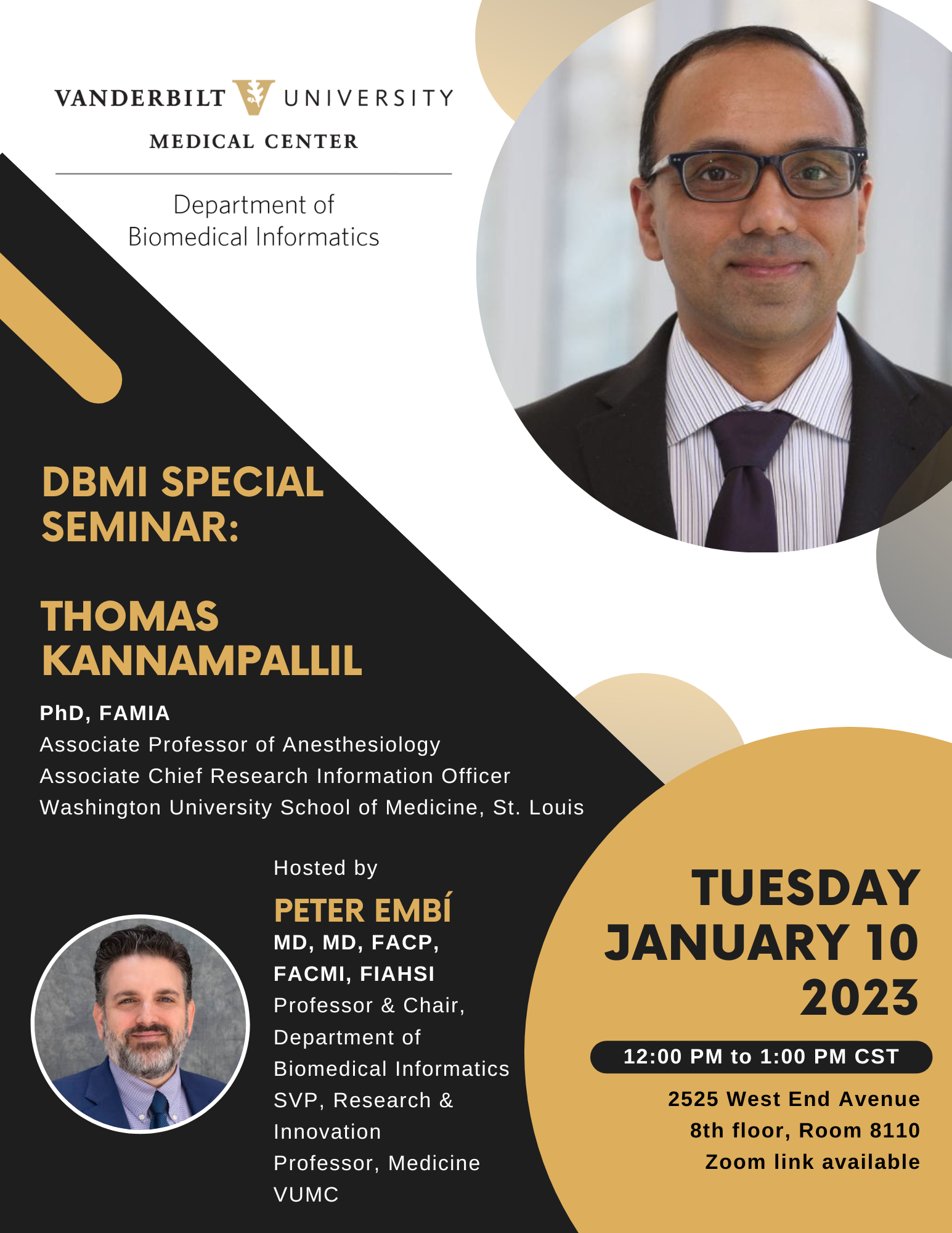
Thomas Kannampallil, PhD, FAMIA
Associate Professor of Anesthesiology
Associate Chief Research Information Officer
Inaugural Director for Acute Care Innovation Research, Department of Anesthesiology
Washington University School of MedicineAbstract:
In this talk, Dr. Kannampallil will discuss the use of raw audit logs—trails of clinicians' click stream activities on an EHR—to measure physician workload cognitive burden and burnout using a combination of statistical and machine learning approaches. In a series of studies, we developed data pipelines and open-source tools for translating raw clickstream data into meaningful EHR use metrics that were used for (a) assessing workload, (b) creating objective measures of errors, and (c) assessing the relationship between workload (and cognitive burden) on errors. He will also describe new directions for research using audit logs including novel mathematical and machine learning techniques to characterize tasks, measuring interactive communication (using Epic SecureChat), and comparing audit log-based workload measures and reimbursements.
-
Wednesday, December 14, 2022
12:00 - 1:00 PM CTEvent Type: DBMI Seminar
Title: "Clinical Informatics within Perioperative Medicine: Potential Spaces for Innovation"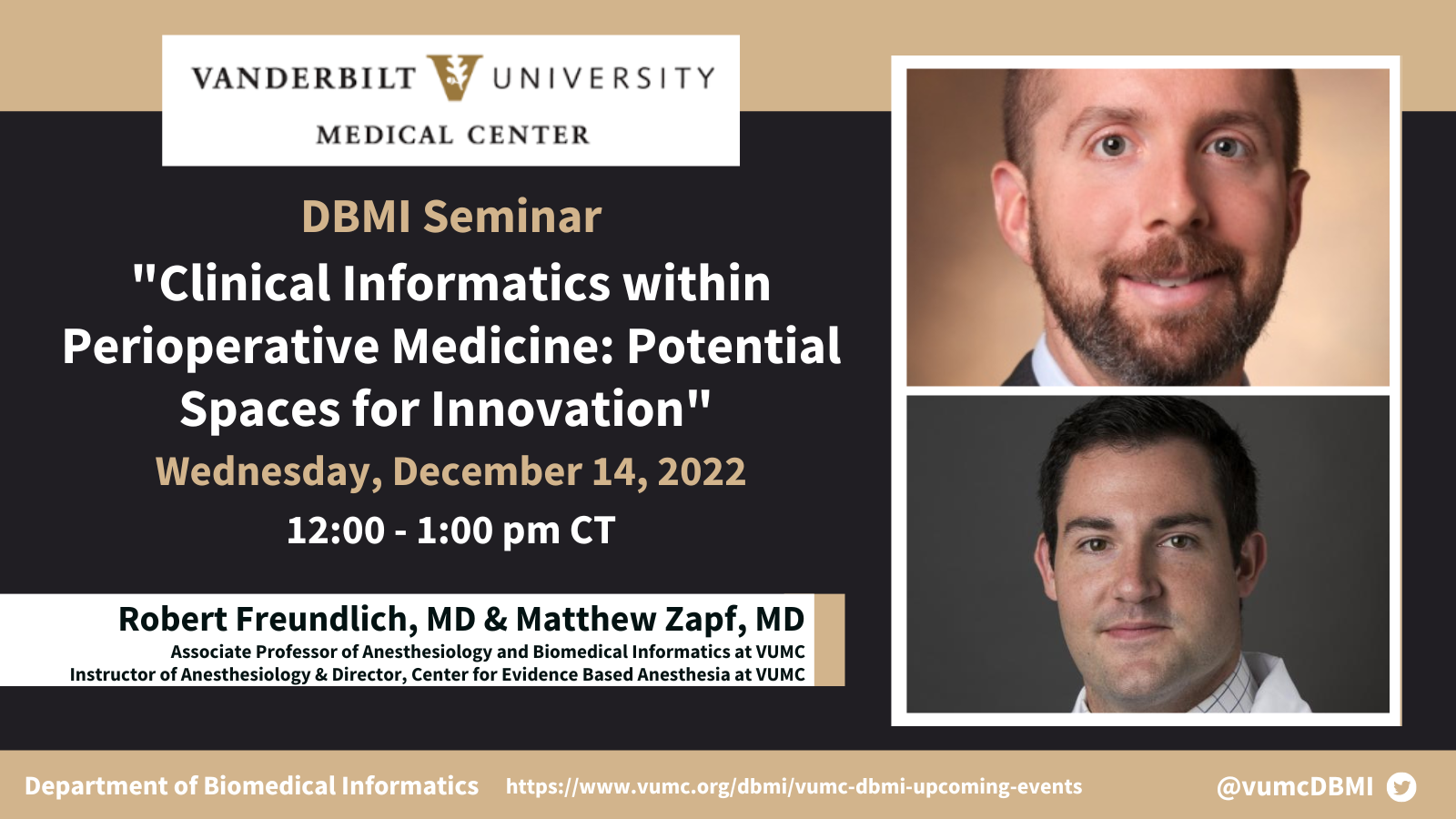
Robert Freundlich, MD, MS, MSCI
Associate Professor of Anesthesiology and Biomedical Informatics
Anesthesiology Critical Care Medicine, Informatics Research Division Chief
VUMCMatthew Zapf, MD
Instructor of Anesthesiology, Department of Anesthesiology Research Informatics Division
Director, Center for Evidence Based Anesthesia, Adult Anesthesiology
VUMCLearning Objectives:
1. Understand the many roles of an anesthesiologist within a large academic medical center.
2. Describe the challenges/highlights of the work from our Anesthesia Research Informatics Group.
3. Consider possible opportunities for collaboration.Abstract:
Anesthesiologists work in a wide variety of roles within the perioperative space from preoperative clinics to intraoperative management and postoperative care. The Anesthesia Research Informatics department leverages the massive amount of available perioperative data to improve patient care and efficiency. There are exciting possibilities for unique collaborations between the VUMC Department of Biomedical Informatics and the Anesthesia Research Informatics Departments.WEDNESDAY, December 7, 2022
12:00 - 1:00 PM CTEvent Type: DBMI Seminar
Title: "Defining & Redefining Human Disease Across the Phenome"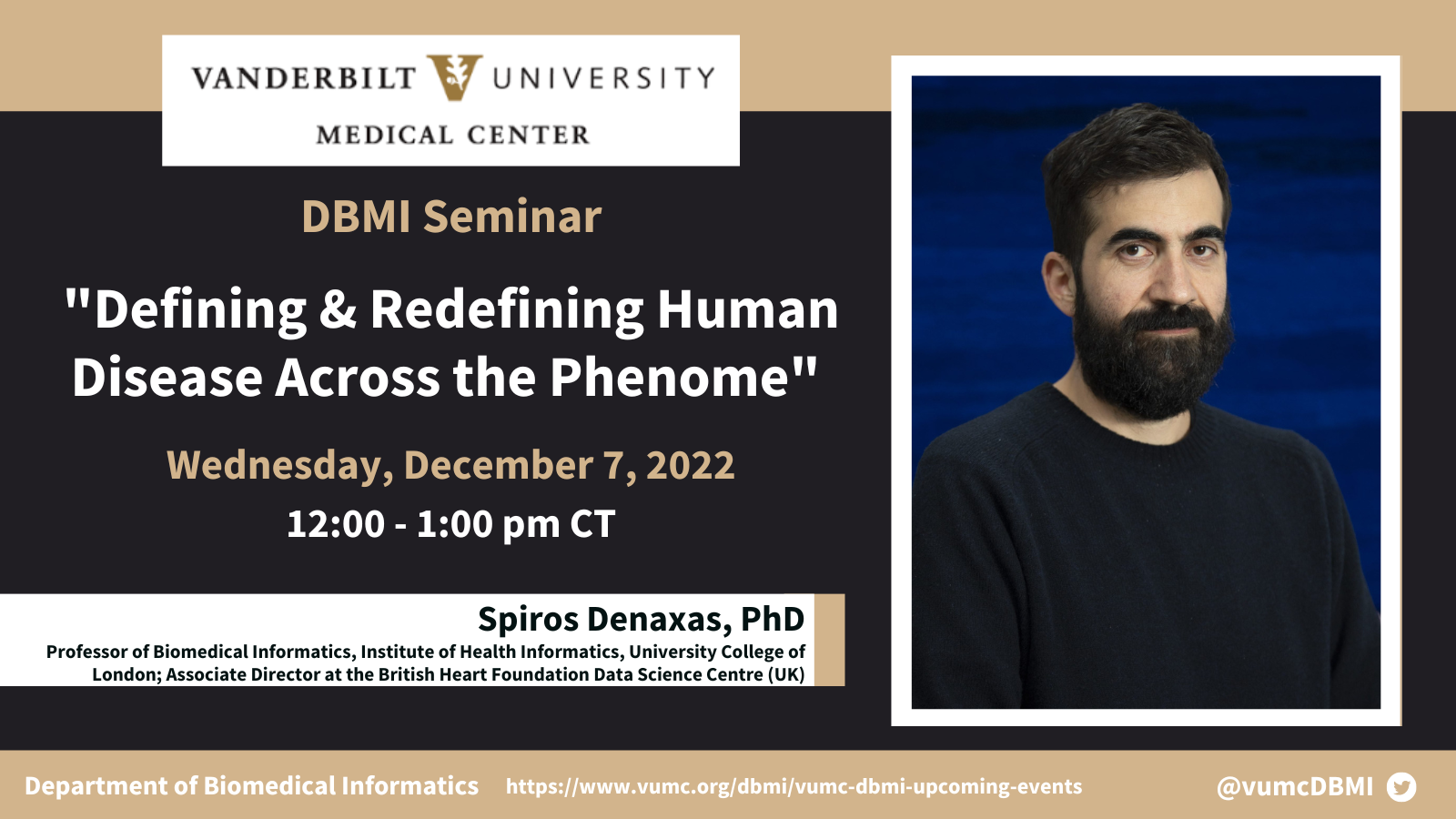
Spiros Denaxas, PhD
Professor of Biomedical Informatics
Institute of Health Informatics
University College of London
Associate Director at the British Heart Foundation Data Science Centre
Health Data Research UKLearning Objectives:
1. Describe the characteristics of structured EHR and provide research use cases.
2. Understand methods that work across the human phenome such as phenome-wide association studies (PHEWAS).
3. Describe key concepts of phenotyping algorithm creation and evaluation.Abstract:
Electronic health records (EHR) are an invaluable research resource for studying the aetiology and prognosis of individual diseases. Working with EHR, however, is challenging due to their complex and messy nature. This talk will focus on the opportunities and challenges in the process of creating and evaluating EHR phenotyping algorithms and explore different ways of scaling analyses in terms of breadth and depth.THURSDAY, DECEMBER 8, 2022
11:00 - 12:00 PM CTEvent Type: DBMI Special Seminar
Title: "Applying Clinical Informatics to Reinvent the EHR: Moving from Billing Diary to Clinical Assistant"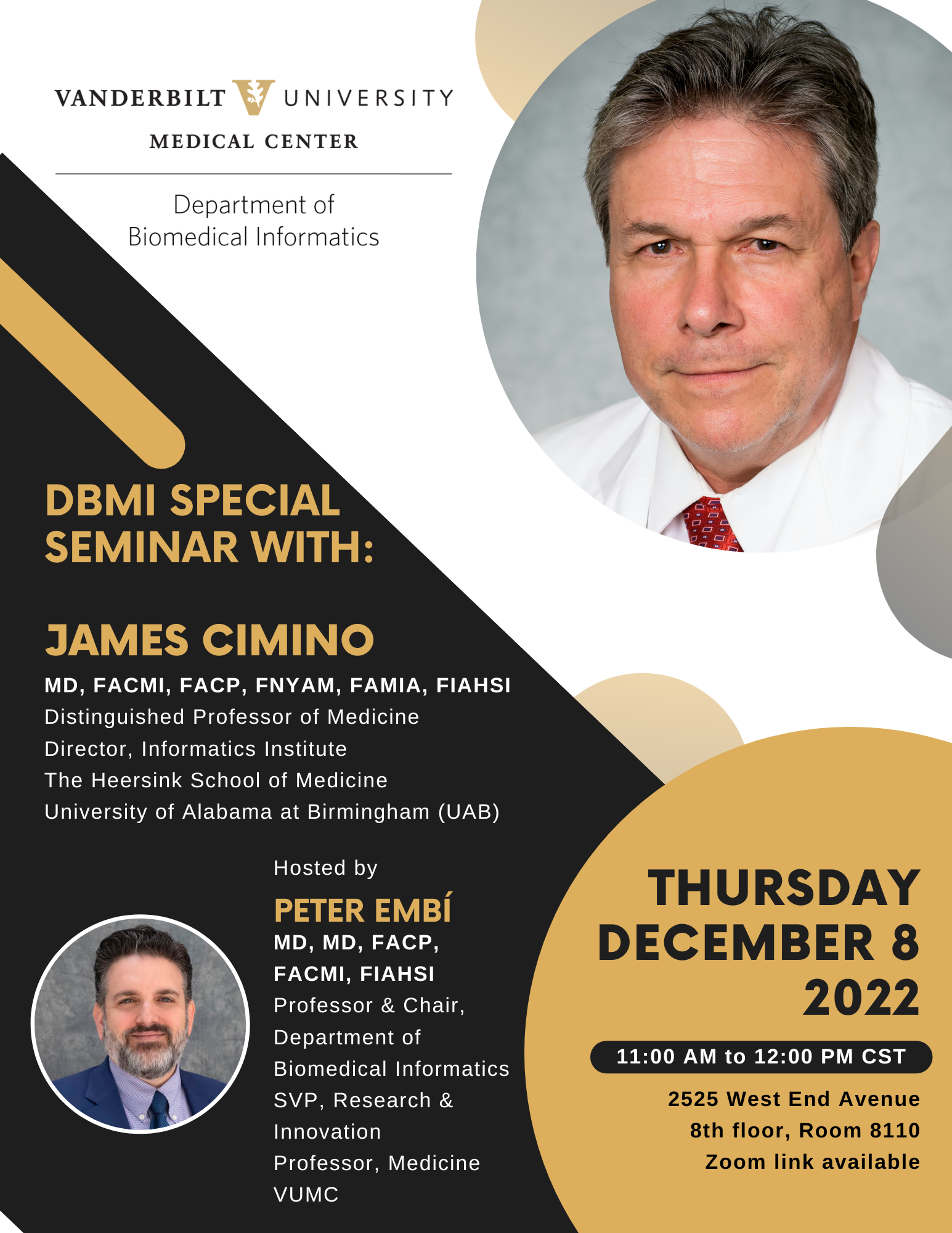
James Cimino, MD, FACMI, FACP, FNYAM, FAMIA, FIAHSI
Distinguished Professor of Medicine
Director, Informatics Institute
The Heersink School of Medicine
University of Alabama at Birmingham (UAB)WEDNESDAY, NOVEMBER 16, 2022
12:00 - 1:00 PM CTEvent Type: DBMI Seminar
Title: "Informatics, AI and Learning Health Systems: Looking to the Future at VUMC and Beyond"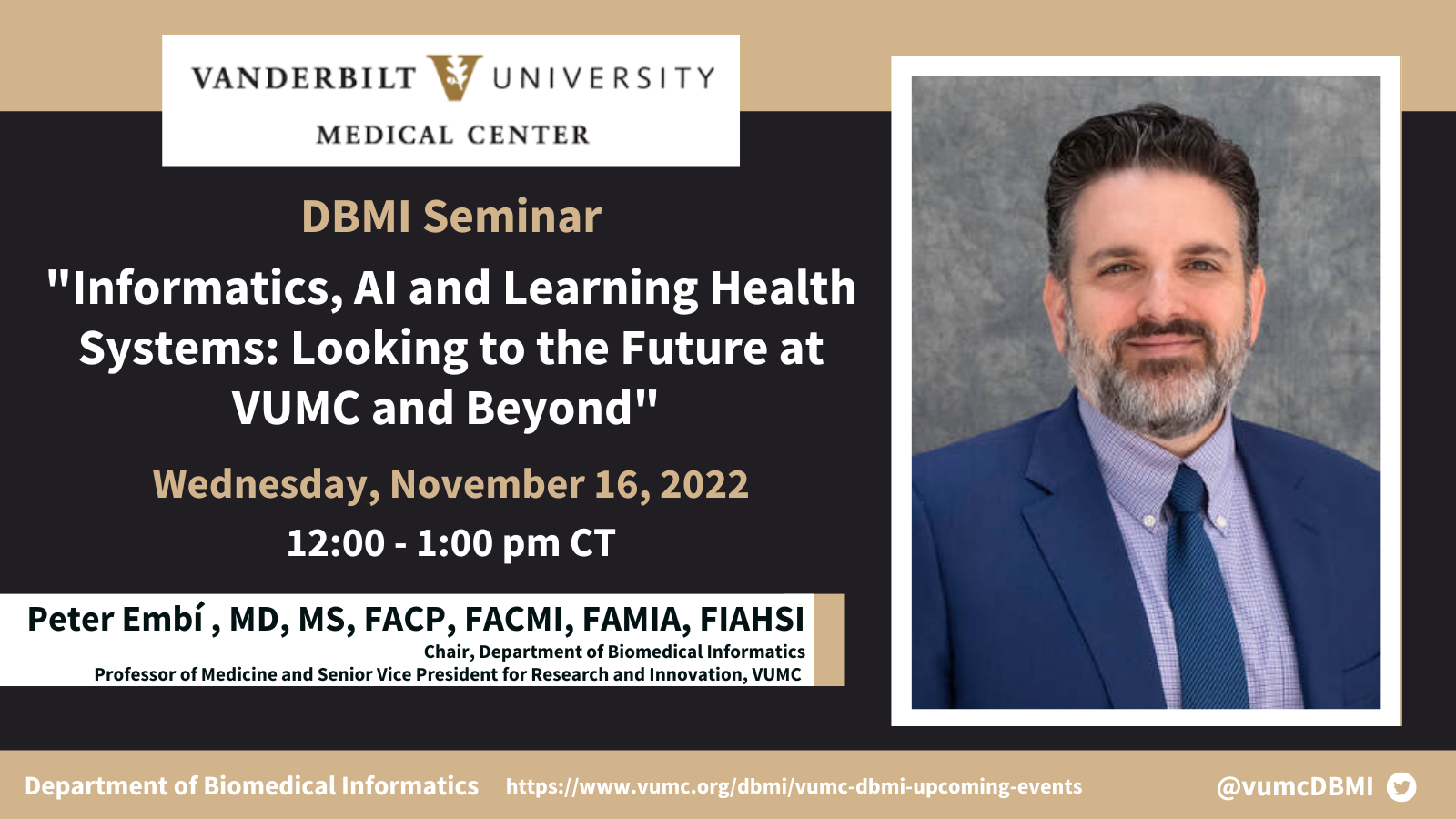
Peter Embí, MD, MS, FACP, FACMI, FAMIA, FIAHSI
Chair, Department of Biomedical Informatics
Senior Vice President for Research and Innovation
Professor of Medicine
Vanderbilt University Medical Center
peter.embi@vumc.orgOCTOBER 19, 2022
Event Type: Vanderbilt Clinical Informatics Center (VCLIC) Seminar
Title: "Beyond Resiliency Training: Strategies to End Burnout"
Dara Mize, MD, MS, FAMIA
Assistant Professor, DBMI and Department of Medicine
HealthIT Clinical Director
VUMCThe dissonant relationship between clinicians and the EHR is well-documented. Personal, organizational, and external factors also influence clinician well-being and contribute to burnout. This session will review the current state of clinician burnout, describe drivers of clinician well-being and demonstrate opportunities for informaticists to respond to the burnout problem.
OCTOBER 5, 2022
Event Type: DBMI Seminar
Title: "EHR Data Quality in Genetic Research: Why You Should Worry & What You Can Do About It"
Lisa Bastarache, MS
Research Associate Professor, DBMILearning Objectives:
1. Describe how biobanks are used for genetic study.
2. Understand high-throughput phenotyping techniques.
3. Learn how to conduct replication experiments with biobank data.Abstract:
Genetics researchers increasingly rely on EHRs as a source of phenotypic data. While EHRs have enormous potential to help us further map the phenotype/genotype terrain, generating accurate phenotypes using real-world EHR data can be challenging. In this talk, I will discuss the way EHR data quality impacts genetics research with concrete examples from both the common/complex and rare disease domains, and describe ways that analysts can detect error and enhance the quality of their EHR-based phenotypes.SEPTEMBER 21, 2022
Event Type: DBMI Seminar
Title: "Enabling Clinical Research and Innovation through a Clinical Informatics Core"
Allison McCoy, PhD, FAMIA, ACHIP
Assistant Professor, DBMI
Director, Clinical Informatics Core, Vanderbilt Clinical Informatics Center (VCLIC)Abstract:
Clinical researchers frequently require special data extracts or unique electronic health record intervention development, often on a short timeline. It can be hard to meet the needs of researchers using standard IT processes. The Vanderbilt's Clinical Informatics Core facility serves the unique needs of researchers using dedicated informatics resources. The core offers the following services to researchers: clinical data extraction and analysis, design and build of EHR interventions, predictive model implementation, value set and logic development, and general clinical informatics consultation. In its first year of operation, the core has facilitated the completion of grant submissions, funded grant research, and publications that would not have been previously feasible. Investigators are satisfied with the cost, quality, and timeliness of the work completed by the core, and they are likely to both recommend the core to colleagues and use the core for future work.Learning Objectives:
- Describe the unique informatics needs of researchers.
- Define a research core facility and the special capabilities and requirements of a core.
- Describe how an informatics core facility can meet the unique needs of researchers.
APRIL 20, 2022Event Type: DBMI Seminar
Title: "Population-Based Biomedical Informatics Approaches to Study Factors Associated with High Rates of Childhood Brain Cancer in Kentucky and Appalachia"
Eric Durbin, DrPH, MS
Director of the Cancer Research Informatics Shared Resource Facility at the Markey Cancer Center
Assistant Professor in the Division of Biomedical Informatics at UK College of Medicine
Director of the Kentucky Cancer Registry
Director of Cancer Informatics at the Kentucky Cancer RegistryAPRIL 13, 2022 - 12:00 PM (CT)
Event Type: DBMI Seminar
Title: "Unique Privacy Needs of the Adolescent Patient in the Electronic Health Record and Patient Portal"Speaker:

Marianne Sharko, MD, MS
Instructor in the Department of Pediatrics and Population Health Sciences
Health Informatics Division
Empire Clinical Research Investigator Program (ECRIP) Scholar at Weill Cornell MedicineMARCH 23, 2022 - 12:00 PM (CT)
Event Type: DBMI Seminar
Topic: "Improving Use of Health Information System: Educational Approaches"
Aviv Shachak, BSc, MSc, PhD, FIAHSI
Associate Professor and Graduate Coordinator, Institute of Health Policy, Management & Evaluation (Dalla Lana School of Public Health)
Associate Professor (cross-appointed), Faculty of Information
University of Toronto
Cross-Appointed Researcher, Wilson Centre for Research in Education
University Health Network and University of Toronto
Abstract:
The benefits of health information technology (HIT) depend on the way they are being used. Education and training are often needed to move from basic to advanced, value-adding use. This talk will describe a number of educational approaches we used to address non-technical challenges of using electronic medical records (EMRs) in primary care: exploratory (productive failure) learning, video tutorials, and simulation. The challenges addressed by these approaches included improving EMR data quality at the point of data entry, use of advanced EMR features for chronic disease management, and impact of the EMR on patient-clinician communication. While these approaches are promising, there is a need for innovation and diversity of educational approaches to address use of advanced HIT features, identified challenges with HIT, and usage in context, as well as for rigorous evaluation.Learning Objectives:
-Describe the rationale behind these three educational approaches.
-Explain the strengths and limitations of each of the educational approaches presented.
-Select an appropriate educational approach for improving use of current and future HIT (e.g. AI-based applications).MARCH 16, 2022 - 12:00 PM (CT)
Event Type: DBMI Seminar
Topic: "Getting to the Heart of It: Making Health Information Actionable for Patients with Cardiac Conditions"
Ruth Masterson Creber, PhD, MSc, RN, FAHA, FAAN
Associate Professor in the Department of Population Health Sciences and Cardiothoracic Surgery
Weill Cornell MedicineAbstract:
Ruth Masterson Creber, Ph.D. M.Sc., RN, is an associate professor in the Department of Population Health Sciences and cardiothoracic surgery at Weill Cornell Medicine. She leads the Patient Decision Support lab at Weill Cornell Medicine. As a trained nurse, epidemiologist and health informatician, she has an independent, interdisciplinary program of research focused on using consumer health informatics tools to support patients with cardiovascular disease management across the care continuum. She will present strategies for making health information actionable for patients who are managing complex cardiac conditions.
Learning Objectives:
-Identify two strategies for developing patient centered consumer health informatics tools.
-Describe how to measure comprehension and why we need to move beyond preferences when evaluating tools with patients.
-Describe why we have an ethical responsibility to return information to patients.